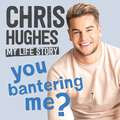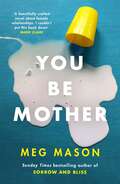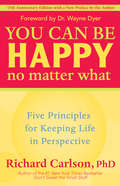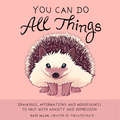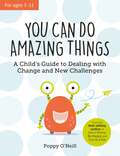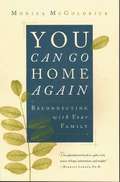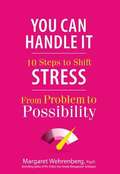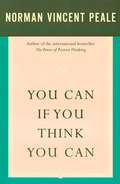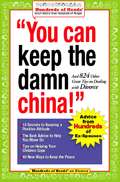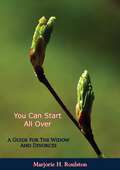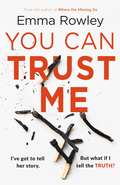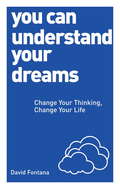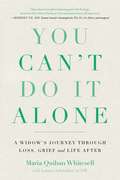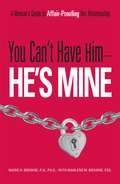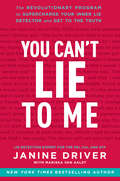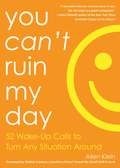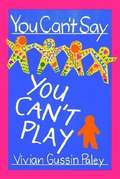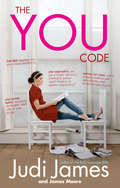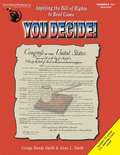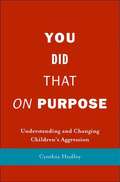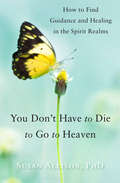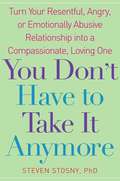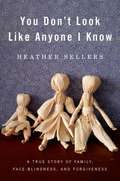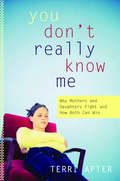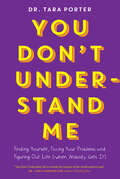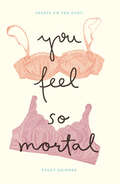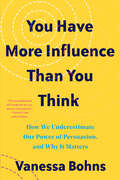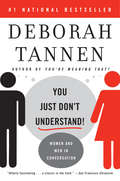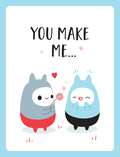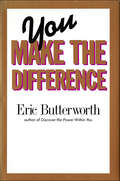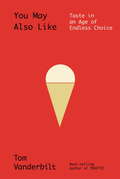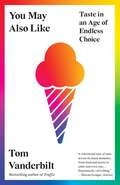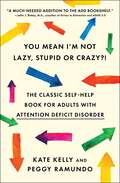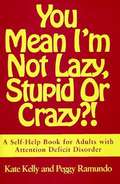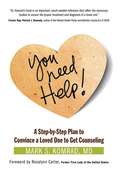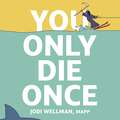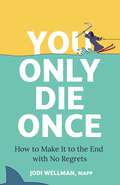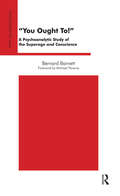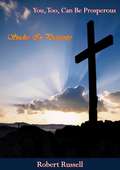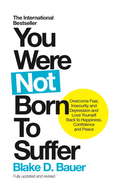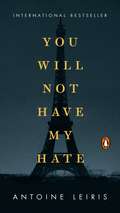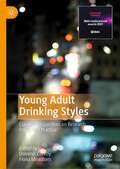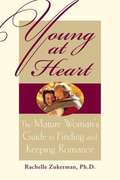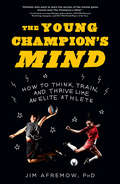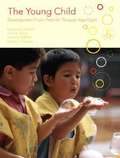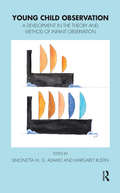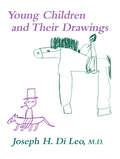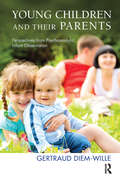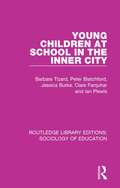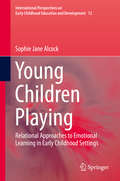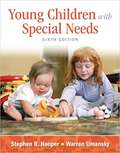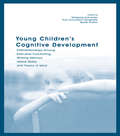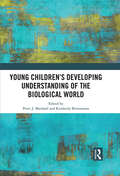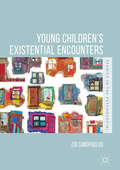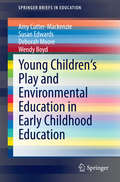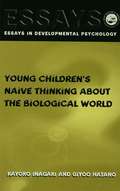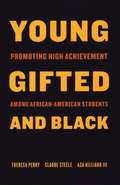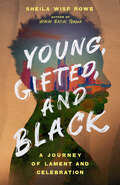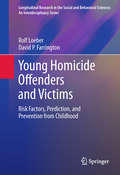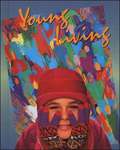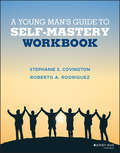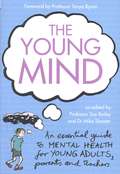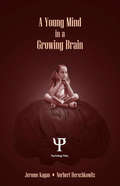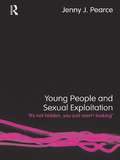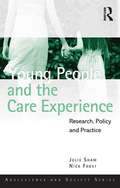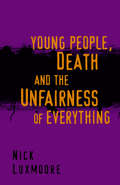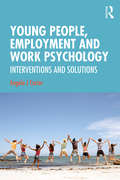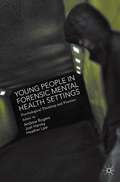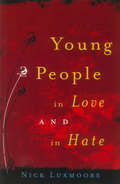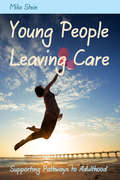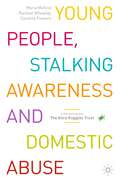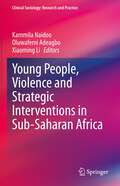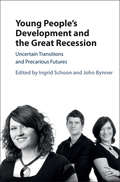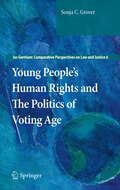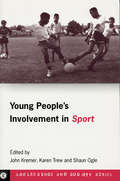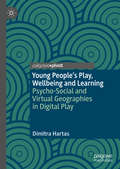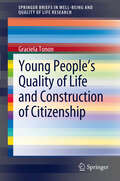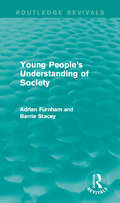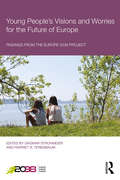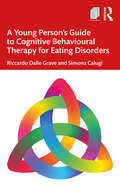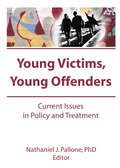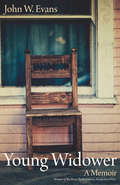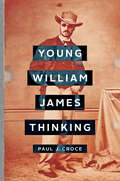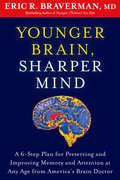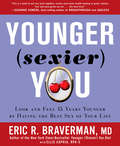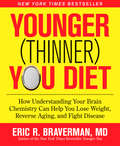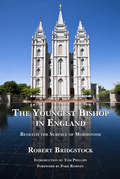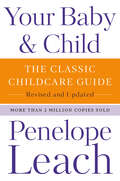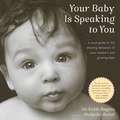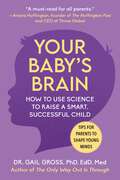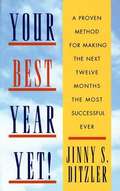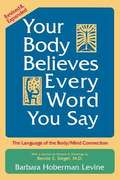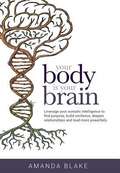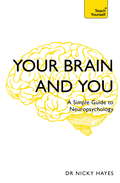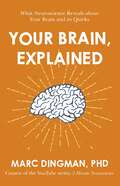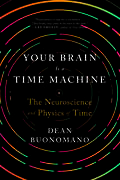- Table View
- List View
You Bantering Me?: The life story of Love Island's biggest star
by Chris HughesWith the nation gripped by Love Island fever, the show's most popular contestant ever shares his unique take on the world in a book that will be hilarious, endearing, heartfelt and as lovable as its author.Chris Hughes walked away from the sizzling hot, smash hit show Love Island as its biggest star. Viewers fell in love with this cheeky, happy-go-lucky guy who surprised people by being unafraid to show his vulnerable side just as readily as having a laugh with his mates in the sun. They were captivated by the rollercoaster relationship between Chris and girlfriend Olivia and entertained by the bromance that developed between Chris and best pal Kem.But what really makes Chris tick? What made this down-to-earth country lad swap life on the farm with his family for red carpets and newspaper front pages? Chris reveals all about his life before the hit reality TV show and how the crippling anxiety he has suffered from before still haunts him to this day. He shares how he has found fame and adjusted to his new life as well as the things he is learning about himself as his life is put under the spotlight for all to see.With his trademark sense of humour and way with words, this is Chris's take on the world, his life laid bare.(P)2018 Hodder & Stoughton Limited
You Be Mother: The debut novel from the author of Sorrow and Bliss
by Meg MasonEVENING STANDARD'S 'BEST FICTION BOOKS TO LOOK FORWARD TO IN 2022'What do you do, when you find the perfect family......and it's not yours?'Rare and delightful . . . A beautifully crafted novel about female relationships. I couldn't put this book down'Marie ClaireThe only thing Abi ever wanted was a proper family. So when she falls pregnant by an Australian exchange student in London, she cannot pack up her old life in Croydon fast enough, to start all over in Sydney and make her own family.It is not until she arrives, with three-week-old Jude in tow, that Abi realises Stu is not quite ready to be a father after all. And he is the only person she knows in this hot, dazzling, confusing city, where the job of making friends is turning out to be harder than she thought.That is, until she meets Phyllida, her wealthy, charming, imperious older neighbour, and they become almost like mother and daughter.If only Abi had not told Phil that teeny tiny small lie, the very first day they met...
You Can Be Happy No Matter What: Five Principles for Keeping Life in Perspective
by Richard CarlsonThe author of the #1 New York Times bestseller Don&’t Sweat the Small Stuff shows readers how to achieve happiness NOW—without solving your problems first. Stop waiting for the best part of your life to begin, or for things get better soon. Dr. Richard Carlson, the author who helped millions of readers stop sweating the small stuff, reminds us all You Can Be Happy No Matter What.Interactive Edition: In this edition, people can experience the book in a wholly new way with Carlson&’s narration of illuminating passages about living joyfully in the present moment. You&’ll discover how understanding five principles—Thought, Moods, Separate Realities, Feelings, and the Present Moment—allows for a new way of living without repressing natural emotions or allowing thoughts or feelings to overwhelm you. Every moment of every day, our minds are working to make sense out of what we see and experience. Yet this is one of the least understood principles in our psychological makeup. Carlson&’s breakthrough work in understanding the nature of thought can be the foundation to a fully functional life. This interactive book aids anyone in understanding the ups and downs of life and how to build resilience. Most importantly, Carlson reminds us not to let the downside get in the way of living joyfully, despite the daily challenges we all face. In his own words, &“Happiness is a state of mind, not a set of circumstances.&”&“A needed counterbalance to the therapy junkie&’s tendency to wallow in &“processing&” while life&’s beauty passes them by.&”—Yoga Journal&“Very helpful—solid, sensible, and filled with loving guidance.&”—Dr. Wayne Dyer, author of Your Erroneous Zones
You Can Do All Things: Drawings, Affirmations and Mindfulness to Help with Anxiety and Depression
by Kate Allan&“Combines wisdom, humor, and beautiful, whimsical artwork that can be your daily companion when you feel anxious, inadequate, and overwhelmed.&” —Susyn Reeve, author of Heart Healing#1 Bestseller in Mental Health, Depression—Mindfulness, Drawings and MeditationsDaily meditations to help with depression and anxiety. Mental health is a topic that affects everyone, though few are eager to discuss it. You Can Do All Things is a compendium of knowing, yet supportive, illustrations from The Latest Kate, whose thoughtful quotations encourage you to be mindful of your own mentality and to take care of yourself, regardless of image or lifestyle. Calming and supportive, the illustrations are also candid about the internal problems many face in our hectic modern world.Inspirational, gentle drawings of animals. Kate Allan&’s inventive pairing of whimsical colors and friendly, smiling animals is the spoonful of sugar that makes the heavy subject matter approachable and nonthreatening. You Can Do All Things is a welcome addition to any reading list, and its messages are equally applicable to adults and children. Anxiety sucks, but you don&’t. This book will show you how to get through the worst of it.In this supportive book you&’ll find:· Beautiful, whimsical, and colorful art· Expressions of encouragement for any hardship you face· A how-to guide for dealing with anxiety and depression· Understanding and validation for your struggles· Tips for every time you feel inadequate, overwhelmed, or down on yourself· Cute animals that believe in you! &“You Can Do All Things is like a best friend: real, raw, and generous in its support.&” —Margarita Tartakovsky, PsychCentral
You Can Do Amazing Things: A Child's Guide to Dealing with Change and New Challenges
by Poppy O'NeillThis activity book is for children aged 7–11 yearsIt’s full of great information, fun activities and top tips to help your child build their resilience and take on new challenges with confidence Does your child shy away from trying new things?Perhaps they have experienced a big change recently and are finding it difficult to articulate their feelings?Do they feel out-of-control at times and want to understand why?These are signs that your child is ready to learn more about how to thrive through life’s changes.This practical guide combines cognitive behavioural therapy and mindfulness methods with simple activities to help your child develop the skills to articulate their feelings and regulate their moods. It’s aimed at children aged 7–11 because a lot happens in these years that can impact a child’s emotional well-being, not just now but for years to come.Your child will be guided, with the help of Bud – a friendly and supportive character they can identify with – through fun and engaging activities which are interspersed with useful tips, inspirational affirmations and practical information for parents and carers.
You Can Go Home Again: Reconnecting with Your Family
by Monica McGoldrick<p>Those who learn from the past are not condemned to repeat it. In this revelatory book, family therapist Monica McGoldrick explains how the use of genograms (family trees) can bring to light a family's history of estrangement, alliance, divorce, or suicide, revealing intergenerational patterns that prove more than coincidental. <p>McGoldrick's genograms of famous families, such as the Kennedys, Hepburns, Beethovens, and Brontës, complement discussion of the influence of birth order and sibling rivalry, family myths and secrets, cultural differences, couple relationships, and the pivotal role of loss. At the close of each chapter are questions that train the reader to think as researcher; with McGoldrick's guidance, we learn to mine previously untapped information about our own family patterns.</p>
You Can Handle It: 10 Steps to Shift Stress from Problem to Possibility
by Margaret WehrenbergIt's a fact. Life is stressful. So make stress useful. Work, home, school - no one is immune. Good news, bad news, even no news can trigger stress. Stress is, well, STRESSFUL! But, YOU can handle it! And this book is here is show you how! Follow the 10, easy steps inside and learn how to be your best self. Other books may give you quick tips and promise success, but You Can Handle It tells you why these techniques work on the brain, and gives you step-by-step directions, worksheets, and scripts that will make implementing these methods feel effortless. In You Can Handle It, Dr. Wehrenberg offers realistic, simple and highly satisfying how-to's to eliminate bad stress from your life, and how to use the good stress for leverage in all arenas of your life.
You Can If You Think You Can
by Dr Norman PealeBest-selling classics by Norman Vincent Peale The Power of Positive Thinking (special 35th anniversary edition). The greatest inspirational best seller of the century offers confidence without fear and a life of enrichment and luminous vitality. Inspiring Messages for Daily Living. Realistic, practical answers to the hundreds of problems we face from day to day -- ordinary problems encountered in personal difficulties, in family relationships, on the job, and in dealing with those around us. You Can if You Think You Can. Dramatic, heartwarming stories of how men and women -- of all ages and in all walks of life -- transformed their lives and careers by following Dr. Peale's philosophy of positive thinking. Learn to develop the vital knowledge of inner power to carry you over every obstacle. The Art of Real Happiness (written with Smiley Blanton, M.D.). An unusual blend of age-old truths and modern psychiatric techniques. Peale and Blanton identify -- and show how to overcome -- essential problems and conflicts that so often plague us and frustrate our chances for happiness.
You Can If You Think You Can
by Norman PealeBest-selling classics by Norman Vincent Peale The Power of Positive Thinking (special 35th anniversary edition). The greatest inspirational best seller of the century offers confidence without fear and a life of enrichment and luminous vitality. Inspiring Messages for Daily Living. Realistic, practical answers to the hundreds of problems we face from day to day -- ordinary problems encountered in personal difficulties, in family relationships, on the job, and in dealing with those around us. You Can if You Think You Can. Dramatic, heartwarming stories of how men and women -- of all ages and in all walks of life -- transformed their lives and careers by following Dr. Peale's philosophy of positive thinking. Learn to develop the vital knowledge of inner power to carry you over every obstacle. The Art of Real Happiness (written with Smiley Blanton, M.D.). An unusual blend of age-old truths and modern psychiatric techniques. Peale and Blanton identify -- and show how to overcome -- essential problems and conflicts that so often plague us and frustrate our chances for happiness.
You Can Keep the Damn China!
by Robert J. Nachsin Jennifer Bright ReichAlmost 50% of American marriages end in divorce, so it stands to reason that most people have experienced the effects of divorce in some way. Breaking up is hard to do, but that rocky road can be smoothed with this guide featuring contributions by hundreds of former spouses who've made it out in one piece. Eye-opening stories and advice cover getting through the initial tough times; how to break the news to your children and help them cope; dealing with bitter in-laws and other family members; legal wrangling and dividing your stuff; maintaining a relationship with your ex (is it possible?); and more.
You Can Start All Over: A Guide For The Widow And Divorcee
by Marjorie H. Roulston Marjorie HillisSeminal early self-help book from renowned author Marjorie H. Roulston, who had a varied life from minister’s daughter to fashion journalist to millionaire’s wife to widow.“THE TITLE of this book, You Can Start All Over, isn’t something dreamed up to sugar-coat an easy, overoptimistic confidence. It is the expression of a strong conviction. I believe that when life brings a devastating change, leaving one alone and desolate, one can start all over. For I have done just that, three different times, two of them for bitterly unhappy reasons.Some people never have to. I frequently meet women, and not always very young ones, who state that they are living in the same houses in which they were born and married. Not long ago, I had occasion to send flowers to the funeral of a woman in her eighties who had never lost her husband or child, had lived along at about the same financial level from the cradle to the grave, and many of whose girlhood friends were sitting right there in the front pews. Nobody seemed to think it remarkable. Nobody, that is, but me.”
You Can Trust Me: The gripping, glamorous psychological thriller you won't want to miss
by Emma RowleyThe gripping psychological thriller full of twists and turns, from the bestselling author of WHERE THE MISSING GO - for fans of FOUND by Erin Kinsley, ALL THE RAGE by Cara Hunter and THE FAMILY UPSTAIRS by Lisa Jewell.'A gripping mystery in two compelling voices, exposing the dark side of influencer culture' Claire McGowan, author of THE PUSH*****************You can trust me.But can I trust you?Olivia is the domestic goddess who has won millions of followers by sharing her picture-perfect life online. And now she's releasing her tell-all autobiography.For professional ghostwriter Nicky it's the biggest job of her career. But as she delves deeper into Olivia's life, cracks begin to appear in the glamorous façade. From the strained relationship with her handsome husband, to murky details of a tragic family death in her childhood, the truth belies Olivia's perfect public image.But why is Olivia so desperate to leave an old tragedy well alone? And how far will she go to keep Nicky from the truth?*****************If you like Clare Mackintosh, Fiona Barton, Teresa Driscoll, Jenny Blackhurst, Rachel Abbott, Laura Marshall, Joy Ellis, Cara Hunter, Mel Sherratt or Lisa Jewell then you will be utterly gripped by this psychological thriller with a massive twist you won't see coming.Praise for You Can Trust Me:'Brilliant characters and unexpected turns! Grows and changes with every reveal...' Louisa de Lange, author of THE DREAM WIFE'So clever, so unpredictable, dark, haunting. I don't have enough words to do it justice' L V Matthews, author of THE PRANK (coming 2021)'An outstanding story. Cleverly plotted, fantastically written and a fast-paced, intriguing read' Lauren North, author of THE PERFECT BETRAYAL'Emotional, gripping and fast-paced. A taut, extremely satisfying thriller' Carys Jones, author of THE LIST'A completely gripping thriller, and a breath of fresh air. You need to read this book' Rebecca Reid, author of TRUTH HURTS'An utterly absorbing novel to escape into' Vikki Patis, author of THE GIRL ACROSS THE STREET'Twists and more twists! Original and gripping...' Jackie Kabler, author of THE PERFECT COUPLE'Atmospheric and claustrophobic. Very cleverly plotted; you won't know who to trust' Catherine Cooper, author of THE CHALET'Loved how it grasped my attention right from the off and then didn't let go!' Sam Carrington, author of SAVING SOPHIE'Curl up on the sofa with You Can Trust Me, Emma Rowley's tense thriller' Grazia'Rowley has a firm grip on language and plot, and her easy, chatty style disguises a genuine emotional intelligence' Daily Mail'An involving and atmospheric psychological thriller' Crime Monthly
You Can Trust Me: The gripping, glamorous psychological thriller you won't want to miss
by Emma RowleyThe gripping psychological thriller full of twists and turns, from the bestselling author of WHERE THE MISSING GO - for fans of FOUND by Erin Kinsley, ALL THE RAGE by Cara Hunter and THE FAMILY UPSTAIRS by Lisa Jewell.'A gripping mystery in two compelling voices, exposing the dark side of influencer culture' Claire McGowan, author of THE PUSH*****************You can trust me.But can I trust you?Olivia is the domestic goddess who has won millions of followers by sharing her picture-perfect life online. And now she's releasing her tell-all autobiography.For professional ghostwriter Nicky it's the biggest job of her career. But as she delves deeper into Olivia's life, cracks begin to appear in the glamorous façade. From the strained relationship with her handsome husband, to murky details of a tragic family death in her childhood, the truth belies Olivia's perfect public image.But why is Olivia so desperate to leave an old tragedy well alone? And how far will she go to keep Nicky from the truth?*****************If you like Clare Mackintosh, Fiona Barton, Teresa Driscoll, Jenny Blackhurst, Rachel Abbott, Laura Marshall, Joy Ellis, Cara Hunter, Mel Sherratt or Lisa Jewell then you will be utterly gripped by this psychological thriller with a massive twist you won't see coming.Praise for You Can Trust Me:'Brilliant characters and unexpected turns! Grows and changes with every reveal...' Louisa de Lange, author of THE DREAM WIFE'So clever, so unpredictable, dark, haunting. I don't have enough words to do it justice' L V Matthews, author of THE PRANK (coming 2021)'An outstanding story. Cleverly plotted, fantastically written and a fast-paced, intriguing read' Lauren North, author of THE PERFECT BETRAYAL'Emotional, gripping and fast-paced. A taut, extremely satisfying thriller' Carys Jones, author of THE LIST'A completely gripping thriller, and a breath of fresh air. You need to read this book' Rebecca Reid, author of TRUTH HURTS'An utterly absorbing novel to escape into' Vikki Patis, author of THE GIRL ACROSS THE STREET'Twists and more twists! Original and gripping...' Jackie Kabler, author of THE PERFECT COUPLE'Atmospheric and claustrophobic. Very cleverly plotted; you won't know who to trust' Catherine Cooper, author of THE CHALET'Loved how it grasped my attention right from the off and then didn't let go!' Sam Carrington, author of SAVING SOPHIE'Curl up on the sofa with You Can Trust Me, Emma Rowley's tense thriller' Grazia'Rowley has a firm grip on language and plot, and her easy, chatty style disguises a genuine emotional intelligence' Daily Mail'An involving and atmospheric psychological thriller' Crime Monthly
You Can Understand Your Dreams
by David FontanaYou Can Understand Your Dreams is a practical, hands-on guide to using our dreams to bring greater fulfilment into our waking lives. Drawing upon traditional Jungian analysis and techniques developed for his dream workshops, Professor David Fontana presents a series of nearly 30 exercises designed to improve the quality of dreams by making them more vivid and revealing, opening a path of step-by-step self-discovery and self-enrichment. His numerous methods include contacting the dream world via the technique of recall or keeping a dream diary, combining extraordinary insight with practicality. Fontana also suggests effective methods for remembering dreams, interpreting them, and decoding the vital messages they bring from the subconscious. He explains how dreams can help you to deal better with anxieties and enhance your personal relationships, and concludes with an A-Z directory of dream symbols and their meanings. This essential book teaches you everything you need to know about the dream world, taking you on an unforgettable journey from learning about the history of dreams to becoming a fulfilled dreamer.
You Can't Do It Alone: A Widow's Journey Through Loss, Grief and Life After
by Maria Quiban WhitesellIn this supportive guide, a widow and a mental health expert provide guidance and thoughtful advice for anyone dealing with traumatic loss.When FOX11's weather anchor Maria Quiban Whitesell's husband Sean was diagnosed with Glioblastoma (GBM), a deadly form of brain cancer, she was completely unprepared. How would she possibly explain what was happening to their young son, Gus? How should she respond when people ask inappropriate questions? What about just dealing with the details of the day-to-day?In You Can't Do It Alone, Whitesell tells her story and teams up with licensed therapist Lauren Schneider to provide readers with a roadmap for walking through illness, death and grief. Whitesell and Schneider explore:Discussing a serious diagnosis in an honest, clear mannerNavigating control over life when you feel no controlFinding your support groupDealing with memories, family and friendsHelping balance work, caregiving, parenting and much, much more
You Can't Have Him, He's Mine: A Woman's Guide to Affair-Proofing Her Relationship
by Marlene M. Browne Marie H. Browne R. N. Esq.Any marriage or long-term relationship can be vulnerable to an affair. In You Can't Have Him-He's Mine, Dr. Marie Browne and Marlene Browne, Esq., outline ways you can protect your relationship-using the techniques and strategies of the homewreckers themselves. This psychotherapist and family law attorney team up to show you: What goes on in the other woman's head to make her go after your spoken-for man; What makes your husband or boyfriend susceptible to her advances; and What you can do to stop her. In each chapter, you'll find proven mate-guarding tactics designed to ward off the would-be other woman. Using the authors' tried-and-true methods, you will become expert at assessing your mate as well as the quality of your relationship and home life for "infidelity vulnerability." Further, you will learn which of your own actions and attitudes may have made your man's affair all but inevitable
You Can't Lie to Me: The Revolutionary Program to Supercharge Your Inner Lie Detector and Get to the Truth
by Janine DriverWhat if you could increase your salary by 15 percent, kick problems and worries to the curb, and get a better night's rest simply by learning how to detect a lie the moment it starts (or even before)? What if you had an easy-to-use test that tipped you off the instant someone held something back from you? An innate lie detector so powerful it becomes an unconscious skill, applicable with any person, in any situation, to help you act fast before what began as an innocent white lie suddenly takes hold of you, your paycheck, or your happiness? No machine built to date has proven more effective than a well-trained human lie detector, says world-renowned body language expert Janine Driver, a former federal law enforcement investigator who has trained agents at the ATF, CIA, and FBI. Today, Driver teaches people like you to supercharge your internal "BS Barometer" quickly and accurately so you can protect yourself from liars and manipulators. You Can't Lie to Me will change the way you look at job applicants, coworkers, dates, salespeople, money managers—anyone from whom you want and deserve the truth— while simultaneously strengthening and deepening your relationships with your siblings, children, friends, and lovers. Driver distills nearly two decades of behind-the-scenes knowledge, cutting-edge science, and relatable case studies into a simple, powerful five-step program. Whether it's with your teenager, spouse, mechanic, or fellow board member, and whether you are communicating face-to-face or through phone calls, e-mails, texts, Facebook posts, or handwritten notes, you will have all the tools and confidence you need to spot deception. More important, you will recognize the truth as you build the caring, authentic connections that make life worth living. In You Can't Lie to Me learn how to perfect your inner lie detector ("BS Barometer") and ban liars from your life, so you can feel more confident and create stronger, more trusting relationships. Lie detection expert Janine Driver delivers a step-by-step, foolproof program to: outsmart disloyal coworkers—and beat them to the plum promotions protect your children from predators and guard aging loved ones—and their nest eggs—from unscrupulous con artists hire honest employees whose resumes and experience you can trust say yes to honest partners and avoid lying cheaters get your boss's attention with these little tips save thousands of dollars each year using rich people's #1 trick
You Can't Ruin My Day
by Allen KleinYou Can’t Ruin My Day contains 52 themes to help readers take back their power and not let other people or other situations ruin their day. Each of these themes has three sections: Wake-Up Call (the potential day-ruiner); Follow-Up Exercise (practical steps to turn it around); and Lighten-Up Laugh (gaining a fresh perspective and moving right along). Keep these tools in your arsenal of things to help you maneuver around roadblocks, setbacks, or upsets you might encounter on any given day. Each of the 52 stories and wake-up calls in the book are amazing and inspiring. One couple lost almost all of their money to Bernie Madoff and his Ponzi scheme; instead of bitterness, they chose to learn from their mistake and move on. From getting a parking ticket to family squabbles to life-changers such as the loss of a job, Klein offers wisdom, good humor, and coping skills that improve the quality of life. You Can't Ruin My Day is designed to help you unload the burdens you have been carrying around with you. The book is not only filled with wise words but also inspiring stories and anecdotes, insightful and motivational quotations, and lighthearted and laugh-producing material.
You Can't Say You Can't Play
by Vivian Gussin PaleyWho of us cannot remember the pain and humiliation of being rejected by our classmates? However thick-skinned or immune to such assaults we may become as adults, the memory of those early exclusions is as palpable to each of us today as it is common to human experience. We remember the uncertainty of separating from our home and entering school as strangers and, more than the relief of making friends, we recall the cruel moments of our own isolation as well as those children we knew were destined to remain strangers.<P> In this book Vivian Paley employs a unique strategy to probe the moral dimensions of the classroom. She departs from her previous work by extending her analysis to children through the fifth grade, all the while weaving remarkable fairy tale into her narrative description. Paley introduces a new rule-"You can't say you can't play"-to her kindergarten classroom and solicits the opinions of older children regarding the fairness of such a rule. We hear from those who are rejected as well as those who do the rejecting. One child, objecting to the rule, says, "It will be fairer, but how are we going to have any fun?" Another child defends the principle of classroom bosses as a more benign way of excluding the unwanted.<P> In a brilliant twist, Faley mixes fantasy and reality, and introduces a new voice into the debate: Magpie, a magical bird, who brings lonely people to a place where a full share of the sun is rightfully theirs. Myth and morality begin to proclaim the same message and the schoolhouse will be the crucible in which the new order is tried. A struggle ensues and even the Magpie stories cannot avoid the scrutiny of this merciless pack of social philosophers who will not be easily caught in a morality tale.<P> You Can't Say You Can't Play speaks to some of our most deeply held beliefs. Is exclusivity part of human nature? Can we legislate fairness and still nurture creativity and individuality? Can children be freed from the habit of rejection? These are some of the questions. The answers are to be found in the words of Paley's schoolchildren and in the wisdom of their teacher who respectfully listens to them.
The You Code: What your habits say about you
by James Moore Judi JamesDid you know that the way you eat your food will be sending subliminal messages out about your sexual habits? Or that the way you decorate your desk, could be helping your boss decide about that promotion or pay rise? We're all aware of the subtle messages of design and marketing but what about the signals you send out about yourself and your personality?The You Code is the book that answers all these questions, uncovering the hidden meaning behind the simplest of choices. Judi James, with co-writer and journalist James Moore, pulls no punches in her addictive and entertaining book which gets to the nub of who you really are, telling you more about yourself than you ever wanted to know, as well as providing an intriguing insight into the people around you. From your favourite TV programme to the type of coffee you drink, even down to the filling in your sandwich, The You Code is a must for anyone who wants to find out more about themselves and, more importantly, what everyone else thinks of them.
You Decide Applying the Bill of Rights to Real Cases Student Edition
by George Smith Alene L. SmithThis is a middle and high school level textbook using real cases to explain the Bill of Rights.
You Did That on Purpose: Understanding and Changing Children's Aggression
by Cynthia HudleySome children are prone to a particular kind of aggression when they are with their peers. For these children, any harm done to them--even something as inconsequential as a jostle in the lunch line--is perceived as intentional. Their style of social information processing, termed "hostile attributional bias," increases the likelihood of retaliating with excessive and inappropriate physical aggression. In this valuable book, parents and professionals who work with children will learn what can be done to better understand and control children's aggression. Beginning with a reader-friendly review of the literature, Cynthia Hudley underscores the substantial risks of long-term problems for elementary-school-age children who demonstrate aggressive behavior. Then, drawing on her work as founder of a successful school intervention program, the BrainPower Program, Hudley describes methods for reducing children's peer-directed aggression. She concludes with a discussion of the importance of broad social contexts in supporting nonaggressive behavior.
You Don't Have to Die to Go to Heaven: How to Find Guidance and Healing in the Spirit Realms
by Susan AllisonHow to use shamanic journeying to find comfort after loss, and transform your life. What if we really didn't have to die to go to heaven? What if we could prove to ourselves through direct experience that spirit worlds exist, that there is no death, that we are all immortal, and that our departed loved ones are fine? We can and they are. Dr. Susan Allison shows us how in this breakthrough book. She teaches how to go into shamanic trance and spirit travel to other realms to meet animal helpers, spirit allies, and gurus, divine teachers and loved ones. Using the information in this book, you can meet and connect or reconnect with your soul tribe. We can overcome our fear of death and feel comfort in knowing where our departed loved ones have gone. No one needs to wait to have a near-death experience before visiting a level of heaven; everyone can go now, meet with spirit allies, guides, and teachers, and transform their lives.
You Don’t Have to Take It Anymore
by Elliott Beard Steven StosnyAs many as one-third of all American women tiptoe through life as if they are walking on eggshells -- at home, they spend most of their time trying to avoid criticism, anger, put-downs, or cold shoulders from their husbands or boyfriends. This verbal and emotional abuse can erupt over anything and everything, matters large and small: housework, cooking, work, spending money, buying household items and clothes for the kids, and going out. Clearly, verbal and emotional abuse is a serious problem. Relationship expert Dr. Steven Stosny has been featured on national media for the revolutionary techniques he uses in his Compassion-Power and Boot Camp programs, which help men rewire their resentment and anger, stop using emotionally abusive language and behavior, and compassionately recommit to their marriages and families. Now, in You Don't Have to Take It Anymore, Dr. Stosny puts his effective, highly sought-after program into print, making it widely available for the first time for women who want to stop walking on eggshells. Drawing on his seventeen years of experience treating thousands of clients, Dr. Stosny explains the many different forms a verbally and emotionally abusive relationship can take. He explains how to identify abuse and why it's important to take action to change the relationship -- for not only is verbal and emotional abuse monumentally destructive to both the adults in the relationship, it also hurts their children. Dr. Stosny shows women and men how to apply his methods at home, shows women how to get their men to change, and demonstrates how they can know if change is permanent. Additionally, Dr. Stosny's program helps women recover from the pain and abuse by practicing self-healing skills so that they can reclaim their natural sense of competence and confidence. Using language that is more compassionate and accessible than in any other book on relationship abuse -- and different tactics from most other therapies and therapists -- You Don't Have to Take It Anymore presents a practical program that both women and men can use to stop verbal and emotional abuse.
You Don't Look Like Anyone I Know
by Heather SellersAn unusual and uncommonly moving family memoir, with a twist that give new meaning to hindsight, insight, and forgiveness. Heather Sellers is face-blind-that is, she has prosopagnosia, a rare neurological condition that prevents her from reliably recognizing people's faces. Growing up, unaware of the reason for her perpetual confusion and anxiety, she took what cues she could from speech, hairstyle, and gait. But she sometimes kissed a stranger, thinking he was her boyfriend, or failed to recognize even her own father and mother. She feared she must be crazy. Yet it was her mother who nailed windows shut and covered them with blankets, made her daughter walk on her knees to spare the carpeting, had her practice secret words to use in the likely event of abduction. Her father went on weeklong "fishing trips" (aka benders), took in drifters, wore panty hose and bras under his regular clothes. Heather clung to a barely coherent story of a "normal" childhood in order to survive the one she had. That fairy tale unraveled two decades later when Heather took the man she would marry home to meet her parents and began to discover the truth about her family and about herself. As she came at last to trust her own perceptions, she learned the gift of perspective: that embracing the past as it is allows us to let it go. And she illuminated a deeper truth-that even in the most flawed circumstances, love may be seen and felt. Watch a Video .
You Don't Really Know Me: Why Mothers and Daughters Fight and How Both Can Win
by Terri ApterUnderstand what your teenage daughter really means--and learn to use your arguments to strengthen your bond with her. Mothers and teenage daughters argue more than any other child-parent pair--on average every two-and-a-half days. These quarrels, Terri Apter shows, are attempts to negotiate changes in a relationship that is valued by both mothers and daughters. A daughter often feels her mother doesn't know or understand her, and by fighting hopes to force her mother into a new awareness of who she really is, how she has changed, and what she is now capable of doing and understanding. But mothers often misinterpret their daughter's outbursts as signs of rejection, and they may pull back feeling hurt and confused. Through case studies and conversations between mothers and daughters, Apter shows mothers how to interpret the meanings behind a daughter's angry words and how to emerge from arguments with a new closeness.
You Don't Understand Me: Finding Yourself, Facing Your Problems and Figuring Out Life (When Nobody Gets It)
by Dr. Tara PorterBeing a young woman today is harder than ever before, but Tara Porter’s empathetic, highly expert approach will guide teenagers, young women and their parents through these difficult years Female adolescence is an ever-shifting, notoriously tricky time of life. And never before have young women had so much freedom and choice. But never before have they had so many demands placed upon them—by themselves as well as by others. How can today’s teenager or young woman cope during this stage? Are there any simple answers? Writing directly to girls and young women, Dr. Tara Porter draws on decades of experience to offer insight into their own psychology. Like a warm letter from a wise friend or big sister, You Don’t Understand Me examines the situation from a young person’s perspective, guiding readers through the various challenges they may encounter. And as well as explaining young women to themselves, it provides an indispensable resource for parents—a glimpse behind the rolled eyes and the protestations of “You don’t understand me!” Filled with simple strategies, clear explanations and current case studies, this book is an essential and deeply human guide for families everywhere.
You Feel So Mortal: Essays on the Body
by Peggy ShinnerFeet, bras, autopsies, hair--Peggy Shinner takes an honest, unflinching look at all of them in You Feel So Mortal, a collection of searing and witty essays about the body: her own body, female and Jewish; those of her parents, the bodies she came from; and the collective body, with all its historical, social, and political implications. What, she asks, does this whole mess of bones, muscles, organs, and soul mean? Searching for answers, she turns her keen narrative sense to body image, gender, ethnic history, and familial legacy, exploring what it means to live in our bodies and to leave them behind. Over the course of twelve essays, Shinner holds a mirror up to the complex desires, fears, confusions, and mysteries that shape our bodily perceptions. Driven by the collision between herself and the larger world, she examines her feet through the often-skewed lens of history to understand what makes them, in the eyes of some, decidedly Jewish; considers bras, breasts, and the storied skills of the bra fitter; asks, from the perspective of a confused and grieving daughter, what it means to cut the body open; and takes a reeling time-trip through myth, culture, and history to look at women’s hair in ancient Rome, Laos, France, Syria, Cuba, India, and her own past. Some pieces investigate the body under emotional or physical duress, while others use the body to consider personal heritage and legacy. Throughout, Shinner writes with elegance and assurance, weaving her wide-ranging thoughts into a firm and fascinating fabric. Turning the category of body books on, well, its ear, You Feel So Mortal offers a probing view of our preoccupation with the body that is both idiosyncratic and universal, leaving us with the deep satisfaction of our shared humanity.
You Have More Influence Than You Think: Art In An Emergency
by Vanessa BohnsAn original investigation of our hidden power to persuade, and how to wield it wisely. If you’ve ever felt ineffective, invisible, or inarticulate, chances are you weren’t actually any of those things. Those feelings may instead have been the result of a lack of awareness we all seem to have for how our words, actions, and even our mere presence affect other people. In You Have More Influence Than You Think social psychologist Vanessa Bohns draws from her original research to illustrate why we fail to recognize the influence we have, and how that lack of awareness can lead us to miss opportunities or accidentally misuse our power. Weaving together compelling stories with cutting edge science, Bohns answers the questions we all want to know (but may be afraid to ask): How much did she take to heart what I said earlier? Do they know they can push back on my suggestions? Did he notice whether I was there today? Will they agree to help me if I ask? Whether attending a meeting, sharing a post online, or mustering the nerve to ask for a favor, we often assume our actions, input, and requests will be overlooked or rejected. Bohns and her work demonstrate that people see us, listen to us, and agree to do things for us much more than we realize—for better, and worse. You Have More Influence Than You Think offers science-based strategies for observing the effect we have on others, reconsidering our fear of rejection, and even, sometimes, pulling back to use our influence less. It is a call to stop searching for ways to gain influence you don’t have and to start recognizing the influence you don’t realize you already have.
You Just Don't Understand: Women and Men in Conversation
by Deborah TannenDeborah Tannen uses telling examples to stunningly demonstrate how even in the closest of relationships women and men live in different worlds made of different words. The deft way she elucidates how our complex verbal give and take works or does not work and shows how the sexes can unravel their tangled language has made You Just Don't Understand a cultural phenomenon and has kept it on the New York Times best seller list for over 4 years.
You Make Me…: The Perfect Romantic Gift to Say “I Love You” to Your Partner
by Summersdale PublishersYou make me completeThere’s nobody quite like your special someone, so say it with this little book! Filled with a collection of heartfelt words to describe the many things, big and small, that you love about your partner, it’s the perfect way to tell them just how much they mean to you.
You Make the Difference
by Eric ButterworthYou Make the Difference speaks directly to those of us who find ourselves preoccupied with the sheer effort of coping with life's many demands and who long for real answers, inner security, and self-fulfillment. Eric Butterworth's wise and inspiring book provides us with guidance for living life to the fullest and achieving that most elusive state: happiness. In this book, he reveals how we carry within ourselves the capacity to transform our lives, and provides a road map to getting to know yourself which, Butterworth says, is the "key to happiness."
You May Also Like
by Tom VanderbiltFrom the bestselling author of Traffic, a brilliant and entertaining exploration of our personal tastes--why we like the things we like, and what it says about us.Everyone knows his or her favourite colour, the foods we most enjoy, and which season of The Sopranos deserves the most stars on Netflix. But what does it really mean when we like something? How do we decide what's good? Is it something biological? What is the role of our personal experiences in shaping our tastes? And how do businesses make use of this information to develop and sell their products? In You May Also Like, Tom Vanderbilt dives deep into this complex and fascinating world. He explores the physiology of eating to reveal how our taste buds, which can only recognize five tastes, interact with our olfactory systems and our memories to create an astounding array of flavours. He shows how difficult it is, even for experts, to pinpoint exactly what makes something good or enjoyable, and how companies like Netflix can make or lose millions based on their ability to predict what we will enjoy. Like his bestselling book Traffic, Vanderbilt's new book takes us on a stimulating and surprising intellectual journey that helps us better understand our world and ourselves, and the things we so often take for granted.From the Hardcover edition.
You May Also Like: Taste in an Age of Endless Choice
by Tom VanderbiltFrom the best-selling author of Traffic, an enlightening and illuminating look at why we like the things we like, why we hate the things we hate, and what our preferences reveal about usWhy is showing up to work wearing the same outfit as a coworker so embarrassing? Why do we venerate so many artists who were controversial or ignored during their lifetimes? What makes an ideal cat an ideal cat, or an ideal beer an ideal beer, in the eyes of expert judges? From the tangled underpinnings of our food taste to our unsettling insecurity before unfamiliar works of art to the complex dynamics of our playlists and the pop charts, our preferences and opinions are constantly being shaped by countless forces. And in the digital age, a nonstop procession of "thumbs up" and "likes" and "stars" is helping dictate our choices. Taste has moved online--there are more ways than ever for us, and companies, to see what and how we are consuming. If you've ever wondered how Netflix recommends movies, how to spot a fake Yelp review, or why books often see a sudden decline in Amazon ratings after they win a major prize, Tom Vanderbilt has answers to these questions and many more that you've probably never thought to ask. With a voracious curiosity, Vanderbilt stalks the elusive beast of taste, probing research in psychology, marketing, and neuroscience to answer myriad complex and fascinating questions. Comprehensively researched and singularly insightful, You May Also Like is a joyous intellectual journey that helps us better understand how we perceive, judge, and appreciate the world around us.From the Hardcover edition.
You Mean I'm Not Lazy, Stupid or Crazy?!: The Classic Self-Help Book for Adults with Attention Deficit Disorder
by Kate Kelly Peggy Ramundo M.D. Edward M. HallowellWith over a quarter million copies in print, You Mean I'm Not Lazy, Stupid or Crazy?! is one of the bestselling books on attention deficit disorder (ADD) ever written. There is a great deal of literature about children with ADD. But what do you do if you have ADD and aren't a child anymore? This indispensable reference -- the first of its kind written for adults with ADD by adults with ADD -- focuses on the experiences of adults, offering updated information, practical how-tos and moral support to help readers deal with ADD. It also explains the diagnostic process that distinguishes ADD symptoms from normal lapses in memory, lack of concentration or impulsive behavior. Here's what's new: The new medications and their effectiveness The effects of ADD on human sexuality The differences between male and female ADD -- including falling estrogen levels and its impact on cognitive function The power of meditation How to move forward with coaching And the book still includes advice about: Achieving balance by analyzing one's strengths and weaknesses Getting along in groups, at work and in intimate and family relationships -- including how to decrease discord and chaos Learning the mechanics and methods for getting organized and improving memory Seeking professional help, including therapy and medication
You Mean I'm Not Lazy, Stupid or Crazy?! The Classic Self-Help Book for Adults with Attention Deficit Disorder
by Kate Kelly Peggy RamundoStraightforward, practical advice for taking control of the symptoms, minimizing the disabilities, and maximizing the advantages of adult ADD. There is a great deal of literature about children with attention deficit disorder, ADD. But what do you do if you have ADD and aren't a child anymore? You Mean I'm Not Lazy, Stupid or Crazy?! focuses on the experiences of adults, offering accurate information, practical how-tos and moral support to help readers deal with ADD. It explains the diagnostic process that distinguishes ADD symptoms from normal lapses in memory, lack of concentration or impulsive behavior, and it addresses: Achieving balance by analyzing one's strengths and weaknesses Getting along in groups, at work and in intimate and family relationships -- including how to decrease discord and chaos Learning the mechanics and methods for getting organized and improving memory Seeking professional help, including therapy and medication Widely used by support groups around the country, You Mean I'm Not Lazy, Stupid or Crazy?! is the indispensable reference for anyone who faces the challenge of ADD on a daily basis.
You Need Help!: A Step-by-Step Plan to Convince a Loved One to Get Counseling
by Mark S Komrad Rosalynn CarterIf you feel that a friend or loved one has a problem and needs professional help, this step-by-step guide will give you the tools to approach, engage, and support him or her.Just about everyone knows a relative, friend, or coworker who is exhibiting signs of emotional or behavioral turmoil. Yet figuring out how to reach out to that person can feel insurmountable. We know it is the right thing to do, yet many of us hesitate to take action out of fear of conflict, hurt feelings, or damaging the relationship.Through a rich combination of user-friendly tools and real-life stories, Mark S. Komrad, MD, offers step-by-step guidance and support as you take the courageous step of helping a friend who might not even recognize that he or she is in need. He guides you in developing a strong course of action, starting by determining when professional help is needed, then moves you through the steps of picking the right time, making the first approach, gathering allies, selecting the right professional, and supporting friends or relatives as they go through the necessary therapeutic process to resolve their problems. Included are scripts based on Komrad’s work with his own patients, designed to help you anticipate next steps and arm you with the tools to respond constructively and compassionately.You will also find the guidance and information needed to understand mental illness and get past the stigma still associated with it, so you can engage and support your loved one with insight and compassion in his or her journey toward emotional stability and health.
You Only Die Once: How To Make It To The End With No Regrets
by Jodi Wellman"YOU ONLY DIE ONCE is a spirited and funny but also profound and highly practical manual for anyone who yearns to show up more fully and wholeheartedly for their all-too-finite time on the planet."Oliver Burkeman, New York Times bestselling author of Four Thousand Weeks: Time Management for MortalsHow many Mondays do you have left? Does that question send you into a panic spiral, or are you convinced that, unlike everyone in the history of life on earth, you will somehow avoid the tragic end and live to tell the tale? Statistically, we get about 4,000 Mondays in our lifetime, so if you're halfway through your life, you might have roughly 2,000 Mondays to go. The good news is that you are in charge of how you spend those days: toiling at a job you hate, or creating a career you love; scrolling mindlessly for hours a day, or pursuing the hobbies and travel that light you up; dreading the end, or living a full life that allows you to greet the Grim Reaper with a smile.Built around the principles of positive psychology, You Only Die Once is the jolt that will bring you back to life, no near-death experience required. Full of practical takeaways and research-backed content, this book will motivate readers to take action on the life they want to be living, acting like a defibrillator for the soul. Accompanied by author Jodi Wellman's charming illustrations, this book won't lecture you about eating more kale or insist that the only path forward is to quit your job and move to Provence (although it's not not suggesting you do that either. The latter, that is. We'd never ask anyone to eat more kale.). Instead, it's a real-life guide to small changes that reawaken your passion and curiosity for life. Packed with inspiring stories, exercises, quizzes, quotes, and a step-by-step plan to awaken the liveliest version of you, You Only Die Once is the healthy dose of mortality you need to start living with urgency and meaning.
You Only Die Once: How To Make It To The End With No Regrets
by Jodi Wellman"YOU ONLY DIE ONCE is a spirited and funny but also profound and highly practical manual for anyone who yearns to show up more fully and wholeheartedly for their all-too-finite time on the planet."Oliver Burkeman, New York Times bestselling author of Four Thousand Weeks: Time Management for MortalsHow many Mondays do you have left? Does that question send you into a panic spiral, or are you convinced that, unlike everyone in the history of life on earth, you will somehow avoid the tragic end and live to tell the tale? Statistically, we get about 4,000 Mondays in our lifetime, so if you're halfway through your life, you might have roughly 2,000 Mondays to go. The good news is that you are in charge of how you spend those days: toiling at a job you hate, or creating a career you love; scrolling mindlessly for hours a day, or pursuing the hobbies and travel that light you up; dreading the end, or living a full life that allows you to greet the Grim Reaper with a smile.Built around the principles of positive psychology, You Only Die Once is the jolt that will bring you back to life, no near-death experience required. Full of practical takeaways and research-backed content, this book will motivate readers to take action on the life they want to be living, acting like a defibrillator for the soul. Accompanied by author Jodi Wellman's charming illustrations, this book won't lecture you about eating more kale or insist that the only path forward is to quit your job and move to Provence (although it's not not suggesting you do that either. The latter, that is. We'd never ask anyone to eat more kale.). Instead, it's a real-life guide to small changes that reawaken your passion and curiosity for life. Packed with inspiring stories, exercises, quizzes, quotes, and a step-by-step plan to awaken the liveliest version of you, You Only Die Once is the healthy dose of mortality you need to start living with urgency and meaning.
You Ought To!: A Psychoanalytic Study of the Superego and Conscience
by Bernard BarnettThe superego is one of those psychoanalytic concepts that has been assimilated into ordinary language, like repression, the unconscious and the Oedipus complex. Because it has become such a familiar notion, its complexity may not always be appreciated, nor the controversy that it can inspire. Its origins, for example, its timing in the course of development, whether and how it is influenced by gender all these questions and others have been the source of lively disagreement. For psychoanalysts it is a fundamental concept of their discipline, but it belongs to a meta psychology whose value is often questioned, and opinions might vary on whether it remains truly alive as a generative, energising idea in contemporary psychoanalysis.
You, Too, Can Be Prosperous: Studies In Prosperity
by Robert RussellRobert A. Russell of the Church of the Epiphany in Denver was an Episcopal minister who taught what would now be recognized as new thought philosophy. Chapters on: The Prosperity Idea, What is Prosperity?, The Source of Wealth, The Magic Box, God Loves a Prosperous Man, Tuning Out Tuning In, Mind Models, Meditations on prosperity.-Print ed.
You Were Not Born to Suffer: Overcome Fear, Insecurity and Depression and Love Yourself Back to Happiness, Confidence and Peace
by Blake BauerIn this life-changing book Blake D Bauer explains why depression, addiction, physical illness, unfulfilling work and relationship problems are caused by years of hiding your true emotions, denying your life purpose and living in fear. Having already helped thousands of people around the world find lasting solutions that conventional medicine, psychiatry or religion couldn't offer, You Were Not Born to Suffer will show you how to free yourself from the destructive thoughts, habits and situations that are stopping you from being happy and well. In simple practical steps you'll learn how to slow down and create a healthier relationship to yourself that is based on acceptance, kindness, honesty and self-worth. You'll also find out how to transform the stress, anxiety and insecurity that result from constantly trying to please others into lasting confidence, self-respect and inner peace. Whether it's negative thinking, financial worry, loneliness, guilt or self-doubt that's holding you back, Blake Bauer's words will move you to take better care of yourself, heal old pain and courageously move forward. If you're ready to enjoy your life, feel passionate about your work and create fulfilling relationships, this book will support you to live authentically, love wholeheartedly and finally value yourself enough to put everyday health and happiness at the centre of your life.
You Will Not Have My Hate
by Antoine LeirisINTERNATIONAL BESTSELLER - "On Friday night you stole the life of an exceptional person, the love of my life, the mother of my son, but you will not have my hate." On November 13, 2015, Antoine Leiris's wife, Hélène Muyal-Leiris, was killed by terrorists while attending a rock concert at the Bataclan Theater in Paris, in the deadliest attack on France since World War II. Three days later, Leiris wrote an open letter addressed directly to his wife's killers, which he posted on Facebook. He refused to be cowed or to let his seventeen-month-old son's life be defined by Hélène's murder. He refused to let the killers have their way: "For as long as he lives, this little boy will insult you with his happiness and freedom." Instantly, that short Facebook post caught fire, and was reported on by newspapers and television stations all over the world. In his determination to honor the memory of his wife, he became an international hero to everyone searching desperately for a way to deal with the horror of the Paris attacks and the grim shadow cast today by the threat of terrorism. Now Leiris tells the full story of his grief and struggle. You Will Not Have My Hate is a remarkable, heartbreaking, and, indeed, beautiful memoir of how he and his baby son, Melvil, endured in the days and weeks after Hélène's murder. With absolute emotional courage and openness, he somehow finds a way to answer that impossible question: how can I go on? He visits Hélène's body at the morgue, has to tell Melvil that Mommy will not be coming home, and buries the woman he had planned to spend the rest of his life with. Leiris's grief is terrible, but his love for his family is indomitable. This is the rare and unforgettable testimony of a survivor, and a universal message of hope and resilience. Leiris confronts an incomprehensible pain with a humbling generosity and grandeur of spirit. He is a guiding star for us all in these perilous times. His message--hate will be vanquished by love--is eternal. From the Hardcover edition.
Young Adult Drinking Styles: Current Perspectives on Research, Policy and Practice
by Fiona Measham Dominic ConroyThis book brings together cutting-edge contemporary research and discussion concerning drinking practices among young adults (individuals aged approximately 18-30 years old). Its chapters showcase an interdisciplinary range of perspectives from psychology, sociology, criminology, geography, public health and social policy. The contributors address themes including how identity becomes involved in young adult drinking practices; issues relating to the non-consumption of alcohol within friendship groups; and the role of social context, religious and ethnic orientation, gender identity, and social media use. In doing so, they highlight changing trends in alcohol consumption among young people, which have seen notably fewer young adults consuming alcohol over the last two decades.In acknowledging the complex nature of drinking styles among young adults, the contributors to this collection eschew traditional understandings of young adult drinking which can pathologise and generalise. They advocate instead for an inclusive approach, as demonstrated in the wide range of disciplinary backgrounds, cultural perspectives, methods and international settings represented in this book, in order to better understand the economic, socio-cultural and pharmacological crossroads at which we now stand. This book will appeal in particular to researchers, theorists, practitioners and policy makers working in the alcohol and drugs field, public health and health psychology, in addition to students and researchers from across the social sciences.
Young at Heart: The Mature Woman's Guide to Finding and Keeping Romance
by Rachelle ZukermanThis insightful guide is written for mature women (40+) who are having trouble finding a compatible man to date or who are already in relationships, but have burning questions about sexuality, body image, money, or communication.
The Young Champion's Mind: How to Think, Train, and Thrive Like an Elite Athlete
by Jim AfremowSports psychologist Jim Afremow has earned accolades from Olympians to professional athletes for his insightful approach to training the mind, body, and spirit of a competitor. Now this award-winning coach is turning his talents to student athletes in the new young adult edition of his highly praised The Champion’s Mind. As student athletes strive to balance their school and sports accomplishments, Dr. Afremow’s sage advice will be a much-needed guide in helping them navigate the field—or rink or court.The Young Champion’s Mind covers such topics as:- Tips on how to get in a “zone,” thrive on a team, and stay humble - How to progress within a sport and sustain excellence long-term - Customizable pre-performance routines to hit full power when the gun goes off or the puck is dropped
The Young Child: Development from Prebirth through Age Eight (5th Edition)
by Margaret B. Puckett Janet K. Black Donna S. Wittmer Sandra H. PetersenA thorough updating of topics including: standards for early childhood programs, the mandates of IDEA, developmental theories, changing demographics, assessments, child care practices and bullying . For child development courses that cover prebirth through age eight, this widely used text discusses major development theories as they relate to physical, social and emotional, and cognitive domains. The book contains extensive applications for those who teach and work with young children, making it particularly appropriate for early childhood education programs.
Young Child Observation: A Development in the Theory and Method of Infant Observation (Tavistock Clinic Series)
by Simonetta M.G. Adamo Margaret RustinObserving young children at play is an everyday and often fascinating and pleasurable experience for many of us. It also has a great pedigree in the development of psychoanalysis from Freud's observation of his grandson's game with the cotton-reel onwards. This book describes the practice of observing young children in home and nursery settings in a systematic and non-intrusive way in order to expand our understanding of their emotional, cognitive, and social development. It uses a psychoanalytic lens to enrich the meaning of what is seen. How do minds and personalities take shape? How can we train people to see what is most relevant in helping children to develop? The chapters range from classic papers by famous practitioners of an older generation to observations completed in recent years in the UK, Europe, and the US. Observation of this sort has also spread to Latin America, India, Australia, Africa, and the Far East. The differences and continuities with Infant Observation are the starting point.
Young Children And Their Drawings
by Joseph di LeoPublished in 1996, Young Children and Their Drawings is a valuable contribution to the field of Psychotherapy.
Young Children and their Parents: Perspectives from Psychoanalytic Infant Observation
by Gertraud Diem-WilleThis book focuses on the intertwining between the development of a child's psyche and its parents' behaviour. It shows the importance of the earliest period of childhood for the development of basic emotional patterns of the personality.
Young Children at School in the Inner City (Routledge Library Editions: Sociology of Education #55)
by Barbara Tizard Peter Blatchford Jessica Burke Clare Farquhar Ian PlewisFirst published in 1988, this work reports on a major British study of children’s progress and behaviour in 33 infant schools. The research looks at children from nursery through to junior school and asks why some children had higher attainments and made more progress than others. Using observations not only in schools but also interviews with children and parents, the children’s skills on entering school were found to have an important effect on progress. In each school, black and white children, and girls and boys were studied, in order gauge whether gender or ethnicity were related to progress.
Young Children Playing
by Sophie Jane AlcockThe subject of this book is young children's emotional-social learning and development within early childhood care and education settings in Aotearoa-New Zealand. The focus on emotional complexity fills a gap in early childhood care and education research where young children are frequently framed narrowly as 'learners,' ignoring the importance of emotional functioning and the feelings with which children make sense of themselves and the world. This book draws on original data in the form of narrative-like framed events to creatively illustrate the complexities in children's diverse ways of feeling, thinking, playing, being, and becoming. Events illuminate the feelings and meanings of observed experiences in holistic and contextualised gestalts. Awareness of unconscious processes, the feeling of feelings, and cultural dimensions of development and meaning-making are addressed. The book emphasises the emergent and psychodynamic nature of children's development and learning with strong links to the role of play and playfulness in the events, drawing on two ethnographically inspired research projects that present theory, experience and practice in real-life events.
Young Children with Special Needs
by Warren Umansky Stephen HooperUnderstand typical child development from birth to five and how children with special needs develop differently. Explore six core developmental domains including: gross motor, fine motor and oral motor development, self-care, cognitive development, communication development, and social and emotional development. Read contributions from a variety of experts, each one explaining the latest early intervention strategies within their area of specialty. Learn the process of assessment and intervention and develop universal skills that best support children and their families. Study cases and discuss successful intervention and assessment methods.
Young Children's Cognitive Development: Interrelationships Among Executive Functioning, Working Memory, Verbal Ability, and Theory of Mind
by Wolfgang Schneider Ruth Schumann-Hengsteler Beate SodianA critical part of early childhood development is the development of "theory of mind" (ToM), which is the ability to take the perspective of another person. The main purpose of this book is to discuss and integrate findings from prominent research areas in developmental psychology that are typically studied in isolation, but are clearly related. Two examples are whether executive functions represent a precursor of ToM or whether ToM understanding predicts the development of executive functions, and to what extent children's level of verbal ability and their working memory are important predictors of performance on both executive functioning and ToM tasks. The chapters in this book give a detailed account of the major outcomes of this research. First, the state of the art concerning current understanding of the relevant constructs (working memory, ToM, executive functioning) and their developmental changes is presented, followed by chapters that deal with interactions among the core concepts. Its main focus is on theoretically important relationships among determinants of young children's cognitive development--considered to be "hot" issues in contemporary developmental psychology.Based on presentations made at an international workshop, this book is divided into two parts. In the first part, five teams of researchers present theoretical analyses and overviews of empirical evidence regarding the core constructs of memory, executive functions, and ToM. The next part deals with the interplay among the core concepts outlined in Part I with developmental trends in the interaction.
Young Children�s Developing Understanding of the Biological World
by Peter J. Marshall Kimberly BrennemanThis book explores current research on young children’s beliefs and knowledge about the biological world – otherwise known as ‘folkbiology’. Contributors discuss factors that shape the development of folkbiological knowledge, as well as possible interventions designed to counteract cognitive biases that can interfere with the development of scientifically informed reasoning about natural phenomena. Taken together, the papers provide insights into the contributions of cognitive biases to the development of biological misunderstandings and into the life experiences and contexts that can contribute to or impede accurate learning of biological concepts. As part of a wider literature, the insights provided by the authors are relevant to the design of educational experiences that will foster children’s exploration and further their understanding of life science ideas.The chapters in this book were originally published as a special issue of Early Education and Development.
Young Children’s Existential Encounters (Studies in the Psychosocial)
by Zoi SimopoulouThis book is a psychoanalytic observation of five children’s existential encounters in their ordinary life at the nursery. It is among the first within psychosocial literature to go beyond adult experiences and explore the existential in young children’s lives as it plays out in their everydayness in symbolic and sensory articulations and in relationship with others; including with the author as someone who arrived looking for it. The author offers analysis in the form of a writing inquiry into meaning, by means of an on-going movement between the self and the other, the interior and the exterior, and psychoanalytic and existential-phenomenological ideas. This is illustrated through a kaleidoscopic account of May, Nadia, Edward, Baba and Eilidhs’ encounters with nothingness, strangeness, ontological insecurity, death and selfhood as these emerged in the time they spent with the author embodying different forms – from concrete objects to dreams – exemplifying an attunement to existential ubiquity. With its relational ground, this work suggests the potential for adults – including researchers, therapists, trainees, educators and parents – to attune to their own existential encounters as a path to understanding those of children.
Young Children's Play and Environmental Education in Early Childhood Education
by Amy Cutter-Mackenzie Susan Edwards Deborah Moore Wendy BoydIn an era in which environmental education has been described as one of the most pressing educational concerns of our time, further insights are needed to understand how best to approach the learning and teaching of environmental education in early childhood education. In this book we address this concern by identifying two principles for using play-based learning early childhood environmental education. The principles we identify are the result of research conducted with teachers and children using different types of play-based learning whilst engaged in environmental education. Such play-types connect with the historical use of play-based learning in early childhood education as a basis for pedagogy In the book 'Beyond Quality in ECE and Care' authors Dahlberg, Moss and Pence implore readers to ask critical questions about commonly held images of how young children come to construct themselves within social institutions. In similar fashion, this little book problematizes the taken-for-grantedness of the childhood development project in service to the certain cultural narratives. Cutter-Mackenzie, Edwards, Moore and Boyd challenge traditional conceptions of play-based learning through the medium of environmental education. This book signals a turning point in social thought grounded in a relational view of (environmental) education as experiential, intergenerational, interspecies, embodied learning in the third space. As Barad says, such work is based in inter-actions that can account for the tangled spaces of agencies. Through the deceptive simplicity of children's play, the book stimulates deliberation of the real purposes of pedagogy and of schooling. Paul Hart, University of Regina, Canada
Young Children's Thinking about Biological World (Essays in Developmental Psychology)
by Giyoo Hatano Kayoko InagakiPresents research on the topic of young children's naive biology, examining such theoretical issues as processes, conditions and mechanisms in conceptual development using the development of biological understanding as the target case.
Young, Gifted and Black
by Claude Steele Theresa Perry Asa HilliardYoung, Gifted, and Black is a unique joint effort by three leading African-American scholars to radically reframe the debates swirling around the achievement of African-American students in school.In three separate but allied essays, Theresa Perry, Claude Steele, and Asa Hilliard place students' social identity as African-Americans at the very center of the discussion. They all argue that the unique social and cultural position Black students occupy, in a society which often devalues and stereotypes African American identity, fundamentally shapes students' experience of school and sets up unique obstacles. And they all argue that a proper understanding of the forces at work can lead to practical, powerful methods for promoting high achievement at all levels.Theresa Perry argues that African-American students face dilemmas, founded in the experience of race and ethnicity in America, that make the task of achievement distinctive and difficult. (For instance: "How do I commit myself to achieve, to work hard over time in school, if I cannot predict when or under what circumstances this hard work will be acknowledged and recognized?") She uncovers a rich and powerful African- American philosophy of education, historically forged against such obstacles and capable of addressing them, by reading African-American narratives from Frederick Douglass to Maya Angelou. She carefully critiques the most popular theoretical explanations for group differences in achievement. And she lays out how educators today-in a postcivil rights era-can draw on theory and on the historical power of the African-American philosophy and tradition of education to reorganize the school experience of African-American students. Claude Steele reports stunningly clear empirical psychological evidence that when Black students believe they are being judged as members of a stereotyped group rather than as individuals, they do worse on tests. He finds the mechanism, which he calls "stereotype threat," to be a quite general one, affecting women's performance in mathematics, for instance, where stereotypes about gender operate. He analyzes the subtle psychology of stereotype threat and reflects on the broad implications of his research for education, suggesting techniques-based again on evidence from controlled psychological experiments-that teachers and mentors and schools can use to counter stereotype threat's powerful effect. Asa Hilliard's ends essay, against a variety of false theories and misguided views of African American achievement, and focuses on actual schools and programs and teachers around the country that allow African-American students achieve at high levels, describing what they are like and what makes them work. Young, Gifted, and Black will change the way we think and talk about African American student achievement and will be necessary reading on this topic for years to come.
Young, Gifted, and Black: A Journey of Lament and Celebration
by Sheila Wise RoweGiving voice to the real-life stories of Black millennials and younger adults, Sheila Wise Rowe goes beyond their struggles to point towards hope, joy, and healing. Drawing on years of counseling trauma and abuse survivors, Wise Rowe provides stories, reflections, and tools for Black readers of all ages as they journey toward healing from the barriers affecting them, their children, and their communities.
Young Homicide Offenders and Victims: Risk Factors, Prediction, and Prevention from Childhood (Longitudinal Research in the Social and Behavioral Sciences: An Interdisciplinary Series)
by Rolf Loeber David P. FarringtonThe first decade of the new century proved to be a deadly one for many children and young people in the United States. Despite increased policing on the streets, higher rates of incarceration, harsher sentencing, stricter control of illegal drugs, and attempts to reduce access to firearms, FBI reports show that more than 7,300 young people between the ages of 15 and 29 were murdered in 2008 alone. It's clear that traditional crime reduction strategies have not stemmed the rising tide of homicides perpetrated by and upon one of society's most vulnerable populations. Innovative, practicable solutions are needed to staunch this lethal trend. Based on the findings of a unique longitudinal study, Young Homicide Offenders and Victims: Risk Factors, Prediction, and Prevention from Childhood now provides experts with unprecedented analysis of prospectively collected data on 1,517 boys and young men who grew up in Pittsburgh, Pennsylvania. Following these males from childhood into early adulthood, examining their lives and the conditions under which they grew up in a representative mid-sized American city, the study forms the basis of this unique volume designed to stimulate debate on key questions of prevention and intervention as well as dispel popular myths about the childhood and adolescent features of homicide offenders and homicide victims. Key areas of coverage include: Early childhood risk factors of young homicide offenders and victims. Insights into homicide offenders' lives as told in their own words.The effectiveness of screening for at-risk youth. Risk factor-based prevention and intervention strategies.The impact of interventions on homicide rates.Policy implications at the local, state, and national levels.Young Homicide Offenders and Victims: Risk Factors, Prediction, and Prevention from Childhood is essential reading for researchers, practitioners, and policy makers across the fields of juvenile justice and criminology, developmental psychology, sociology, psychiatry, public health, and policy making. ------- "This book changes the game in violence research ... The analysis is masterful, the prose is readable, and the achievement is nothing short of stunning." Richard Rosenfeld, Ph.D. / Curators Professor of Criminology and Criminal Justice, University of Missouri-St. Louis "This book will stand the test of time as a landmark homicide study." James C. Howell, Ph.D. / Senior Research Associate, National Gang Center "This is a fascinating, pioneering book ... The authors' sophisticated analyses demonstrate convincingly the considerable value of prospective longitudinal data for enhancing our understanding of the etiology and control of lethal violence." Steven F. Messner, Ph.D. / Distinguished Teacher Professor, Department of Sociology, University at Albany, SUNY / President, American Society of Criminology
Young Living (Eighth Edition)
by Nanalee ClaytonBuild a foundation of life management skills for your middle school students. Solid content and a vibrant visual appeal make this text a favorite comprehensive overview of all family and consumer sciences areas.
A Young Man's Guide to Self-Mastery, Workbook
by Stephanie S. Covington Roberto A. RodriguezHow practitioners can work with young male clients within a gender-responsive treatment program Adverse life events can experience significant impairment in neural development which can lead to weakened critical thinking, diminished emotional intelligence, and increased antisocial behavior. Statistics show that traditional treatment programs are inadequate in helping young men—estimated to account for 68% of all teens struggling with substance use disorder—to achieve sustained abstinence that leads to recovery. A Young Man's Guide to Self-Mastery provides practical guidance on implementing an effective trauma-informed, gender-responsive treatment program that addresses the impact of socialization, adverse life experiences, and substance use. This invaluable guide explains the theoretical foundation and real-life connection between trauma and substance use, and provides clear guidelines and actionable strategies for treating boys and young men challenged by trauma and substance use disorder. Provides guidance on integrating evidence-based interventions, mindfulness techniques, and experiential activities Covers the effects of environmental trauma, gender development awareness, socialization, identity, sexuality, relational violence, and aggression Examines trauma's impact on families, mental health, and comorbid and addictive behavior Discusses the key elements of strength-based approaches and mentoring A Young Man's Guide to Self-Mastery is an invaluable resource for practitioners working with male adolescents in mental health clinics, juvenile justice facilities, and residential and outpatient facilities.
The Young Mind
by Mike Shooter Sue BaileySadly, millions of children today are affected by mental health problems, almost a doubling of the number of sufferers in just one generation. Now, in this timely new book, mental health experts provide invaluable information and guidance for concerned parents, teachers and young adults. With chapters covering subjects such as child and adolescent development, parenting skills, problems at school, emotional health and wellbeing, The Young Mind also looks specifically at some of the most distressing problems facing young people today, including anxiety and stress disorders, drugs, alcohol, self-harm and psycho-sexual development.Illustrated and written in a completely accessible style by some of the most distinguished and respected professionals in the field of child and adolescent psychiatry, The Young Mind offers a guiding hand and insight into this most vital area of mental health.
A Young Mind in a Growing Brain
by Jerome Kagan Norbert HerschkowitzA Young Mind in a Growing Brain summarizes some initial conclusions that follow simultaneous examination of the psychological milestones of human development during its first decade and what has been learned about brain growth. This volume proposes that development is the process of experience working on a brain that is undergoing significant biological maturation. Experience counts, but only when the brain has developed to the point of being able to process, encode, and interact with these new environmental experiences. This book's aim is to acquaint developmental biologists and neuroscientists with what has been learned about human psychological development and to acquaint developmental psychologists with the biological evidence. The hope is that each group will gain a richer appreciation of both knowledge corpora. The authors hope to appeal to neuroscientists, psychologists, psychiatrists, pediatricians, and their students. The idea for this book was born in 1993 when the authors--a leading developmental psychologist and a pediatrician--met for the first time and recognized the complementarity of their backgrounds and the utility of a collaboration. The reception of their first two papers motivated this attempt to synthesize the available information over a longer developmental era. Learning a great deal over the past decade, the authors hope that their enthusiasm provokes an equally intense curiosity in readers.
Young Minds in Social Worlds: Experience, Meaning, and Memory
by Katherine NelsonKatherine Nelson re-centers developmental psychology with a revived emphasis on development and change, rather than foundations and continuity. She argues that children be seen not as scientists but as members of a community of minds, striving not only to make sense, but also to share meanings with others. A child is always part of a social world, yet the child's experience is private. So, Nelson argues, we must study children in the context of the relationships, interactive language, and culture of their everyday lives. Nelson draws philosophically from pragmatism and phenomenology, and empirically from a range of developmental research. Skeptical of work that focuses on presumed innate abilities and the close fit of child and adult forms of cognition, her dynamic framework takes into account whole systems developing over time, presenting a coherent account of social, cognitive, and linguistic development in the first five years of life. Nelson argues that a child's entrance into the community of minds is a slow, gradual process with enormous consequences for child development, and the adults that they become. Original, deeply scholarly, and trenchant, Young Minds in Social Worlds will inspire a new generation of developmental psychologists.
Young People and Sexual Exploitation: 'It's Not Hidden, You Just Aren't Looking'
by Jenny J. PearceWork with sexually exploited young people can be rewarding yet difficult. They can be hard to access, often presenting challenging behaviour. Sometimes it is painful to hear their life stories, whether these include abuse through the Internet or exploitation experienced through having been trafficked into and within the country. Jenny J. Pearce draws on young people’s voices to explore the difficulties that arise for researchers and for practitioners when working with sexually exploited young people. While child protection interventions must guide social work, she argues that other agencies such as health, education, housing and training each have a role to play in supporting a sexually exploited young person. Challenging the uncritical acceptance of the child as victim, the book suggests ‘therapeutic outreach’ as an approach to working with sexually exploited young people that can complement child protection procedures, support practitioners in the field and enhance the young person’s sense of autonomy and responsibility during their transition to adulthood. The book advocates the relationship between practitioners and the young people they aim to support to be one of the most important resources in practice. Young People and Sexual Exploitation will be essential reading for anyone interested in preventing the sexual exploitation of children and young people. It will be particularly relevant for academics, students, practitioners and policymakers in the fields of social policy and social work, child and family work, child protection and youth work.
Young People and the Care Experience: Research, Policy and Practice (Adolescence and Society)
by Julie Shaw Nick FrostThe care system looks after the most vulnerable young people in society – those who are, for a variety of reasons, unable to live with their parents. Young People and the Care Experience examines what can be done to support young people to remain at home, and if this is not possible, how they can be supported whilst in care and on leaving care. The book explores the range of options – foster care, children’s homes and adoption – and how these options interact. Using the latest research and framing the issues through both psycho-social and legal perspectives, the book provides an in-depth analysis of young people’s experience of the care system, and how it can be improved. Examining the challenges faced by children on their journey from initially entering care to living independently after care, the book places these issues in a global context. Specifically, it discusses how to support children and young people at home an analysis of the history and demographics of children placed in care the challenges faced by children living in foster care the challenges faced by children living in a children’s home. the challenges faced by children being adopted leaving care The book will be of interest to all those working with children in care, or those who have experience of the care system as a professional, carer or young person. It will also be of interest to researchers and students of developmental and social psychology, social work, and also to policy makers.
Young People, Death and the Unfairness of Everything
by Nick LuxmooreA taboo subject in today's society, death is something that we do not like to talk about and especially do not like young people talking about. Yet, without opportunities to talk, young people's anxieties about death can manifest themselves in all sorts of self-destructive and socially-destructive ways. In this book, Nick Luxmoore explores the problems that arise when death is not openly discussed with young people and offers invaluable advice about how best to allay concerns without having to pretend that there are easy answers. He covers all of the key issues from the physicality of death to the fear of not existing to the way young people's morality develops and he provides expert insight into the impact these subjects have on young people's behaviour. This book presents a wealth of information for professionals, parents and others working with young people, providing the skills needed to ask young people the difficult question, "Do you think much about death?", and to support them as they begin their answer.
Young People, Employment and Work Psychology: Interventions and Solutions
by Angela J CarterYouth unemployment and underemployment is a serious issue in most developed countries in the world. Having few young people in the workplace has serious and lasting consequences for generations of young people, their families, businesses and society as a whole. Dr Carter explores these important issues from multiple (and international) perspectives, offering research evidence and guiding frameworks from social and work psychology, to get more young people into good work. Young People, Employment and Work Psychology brings together educators, researchers, occupational psychologists, and government agencies responding to young people struggling to gain and sustain employment. Theoretically based and evidence-driven, this book explores the consequences of unemployment, suggests ways in which businesses can enable young people's first steps into employment and gives practical advice to young people and employers to prepare for and gain entry-level roles and develop more diverse workplaces. From the reasons why organizations are often reluctant to employ young people, to issues of motivation and confidence which often affect young people’s perspective in looking for work, the book covers several interventions within both the public and private sector. This book is an invaluable resource for employers, policy makers and professionals working with young people, as well as students and researchers in work and organizational psychology, HRM, business management and social policy.
Young People in Forensic Mental Health Settings: Psychological Thinking and Practice
by Joel Harvey Andrew Rogers Heather LawYouth crime and youth violence blights our communities and shapes the lives of many, whether they are victims, perpetrators or family members. This book examines the application of psychological thinking and practice when working with young people who display high risk behaviours across a broad range of forensic mental health settings in the UK. It provides an up-to-date account of current thinking and practice in the field and the challenges of applying effective psychological approaches within forensic settings for young people. The contributors to Young People in Forensic Mental Health Settings are drawn from a range of environments including universities, youth offending services, secure in-patient settings, young offender institutions, Community Forensic Child and Adolescent Mental Health Services (F-CAMHS), and secure children's homes. This volume serves as an important platform for debate and as a forum for discussing the future delivery of psychologically informed services, intervention and mental health provision with young people who display high-risk behaviours.
Young People in Love and in Hate
by Nick LuxmooreThis book is about boyfriends and girlfriends - getting them, keeping them and moving on from them. Young people put enormous energy into these processes: they worry, they hope, they conspire and they cry because, in a sense, having a boyfriend or girlfriend is about much more than just having a boyfriend or girlfriend. Using dozens of recognisable vignettes, Luxmoore movingly describes his work with young people. In particular, he explores the dramatic conflict between young people's loving and hating as they move from the intimacy of relationships with parents to relationships with boyfriends and girlfriends, frantically negotiating sex and sexuality, the meaning of love, faithfulness and unfaithfulness and many other issues vital to the adults these young people will become. The book will be essential reading for professionals and parents struggling with the ferocity of young people's feelings where 'I love you!' and 'I hate you!' are never far apart.
Young People Leaving Care: Supporting Pathways to Adulthood
by Mike SteinThe journey to adulthood is a big step for all young people. However, for young people leaving care it may be far more difficult, coping with major changes in their lives and at a younger age, especially if they lack preparation and support. Young People Leaving Care explores the journey from care to adulthood through the main challenges these young people face: in being in settled accommodation, in fulfilling their potential in education, employment or training, and in achieving and maintaining good health and a positive sense of wellbeing. For each of these pathways, the book provides a comprehensive review of relevant research, how young people might be best supported, and how the services they receive have the potential to increase resilience and boost their chances of enjoying a fulfilled life as a young adult. This is an essential book for all those who work with young people from care, including social workers, personal advisers, counsellors, teachers, policy makers, researchers and students in the field of child welfare.
Young People, Stalking Awareness and Domestic Abuse
by Maria Mellins Rachael Wheatley Caroline FlowersThis book addresses domestic abuse and stalking among young people in the UK and Ireland, with a focus on intersectionality and lifestyle settings. In partnership with the Alice Ruggles Trust, this book draws on a wealth of expert contributions including those with lived experience, frontline services such as Paladin National Stalking Advocacy Service, charities EmilyTest and Hollie Gazzard Trust, researchers of so-called honour-based abuse and online harms, and forensic psychologists who work with people who stalk. It begins with an overview of ways to recognise harmful behaviours, including those carried out online. The discussion then moves on to methods and motivations of stalking and coercive control and the various lifestyle contexts including education environments, young people in the workplace, and the role of the police and frontline support services in tackling these issues. It is a vital resource for undergraduate students across criminology, sociology, law, psychology, education, social justice, policing, and forensic psychology, as well as a combination of academic researchers and professionals working within stalking and domestic abuse support and prevention. This action-orientated book also includes 'Key Points' and ‘Discussion Questions’ in each chapter to direct student learning in the classroom and to create discussion points for wider readers.
Young People, Violence and Strategic Interventions in Sub-Saharan Africa (Clinical Sociology: Research and Practice)
by Kammila Naidoo Oluwafemi Adeagbo Xiaoming LiThis edited volume offers a rich collection of up-to-date research and critical scholarship from various African institutions on incidents of youth violence, intervention and prevention in sub-Saharan Africa. It integrates thinking, evidence, responses, and debates relating to this topic, laying the basis for fresh insights and innovative strategies. The chapters capture a spectrum of pertinent issues such as economic hardship, lockdowns, sexual and reproductive health, pregnancy, online sexual harassment, xenophobic violence, and micro-aggressions in school contexts, and present guidelines on how countries might learn from successful interventions recently implemented. They explore young people’s access to familial and community resources, state-sponsored initiatives, peer counselling, youth-friendly services, and other relevant structures. Thus, among other things, this volume stimulates further debate on what is driving violence in different African contexts—specifically, how intersectional identities create vulnerabilities to violence—and influences ways of dealing with the issue. This interdisciplinary and cross-cutting volume serves as a vital resource for experts at universities, in international organisations, civil society groups and intergovernmental organisations who wish to both analyse and take action to address and prevent the type of violence that currently afflicts young people sub-Saharan Africa today.
Young People’s Development and the Great Recession: Uncertain Transitions and Precarious Futures
by Ingrid Schoon John BynnerThe 2007–8 financial crisis and subsequent 'Great Recession' particularly affected young people trying to make their way from education into the labour market at a time of economic uncertainty and upheaval. This is the first volume to examine the impact of the Great Recession on the developmental stage of young adulthood, a critical phase of the life course that has great significance in the foundations of adult identity. Using evidence from longitudinal data sets spanning three major OECD countries, these essays examine the recession's effects on education and employment outcomes and consider the wider psycho-social consequences, including living arrangements, family relations, political engagement, and health and well-being. While the recession intensified the impact of pre-existing trends towards a prolonged dependence on parents and, for many, the precaritisation of life chances, the findings also point to manifestations of resilience, where young people countered adversity by forging positive expectations of the future. Recasts the concept of youth transitions within a contemporary life course perspective, taking into account micro and macro influences Provides a more holistic understanding of recession effects, and offers pointers where new policy regarding, for example, education and training is urgently needed; Draws on data collected for a number of large-scale, national representative and longitudinal data sets; Illustrates the role of social policy in buffering the effects of the recession, and how these vary across countries.
Young People’s Human Rights and the Politics of Voting Age
by Sonja C. GroverYoung People's Human Rights and The Politics of Voting Age explores the broader societal implications of voting age eligibility requirements and the legislative bar against youth voting in North America and in Commonwealth countries (where 'youth' is defined as persons 16 and over but under age 18). The issue is raised as to whether the denial of the youth vote undermines democratic principles and values and ultimately the human dignity of youth. This is the first book to address the topic of the youth vote in-depth as a fundamental human rights concern relating to the entitlement in a democracy to societal participation and inclusion in influencing policy and law which profoundly affects one's life. Also examined are international perspectives on the issue of voting age eligibility. The book would be extremely valuable for instructional purposes as one of the primary texts in undergraduate or graduate courses on children's human rights, political psychology, political science , sociology of law or society and as a supplementary text for courses on human rights or constitutional law and would be of interest also to members of the general public concerned with children's human rights issues.
Young People's Involvement in Sport (Adolescence and Society)
by John Kremer Karen Trew Shaun OgleBased on survey data derived from face-to-face interviews with 2,400 schoolchildren, 600 four-day diaries and focus groups with both elite performers, coaches and parents, the book offers a comprehensive overview of young people's involvement in sport and physical activity in the 1990s. Deliberately set in the context of the literature on sport involvement and participation motivation, and alongside wider policy concerns, individual contributors each have accessed the data in order to address a particular substantive topic.Given the almost complete absence of hard data currently available in this field, the book should appeal not only to a local audience but to a wider international readership including sport scientists, sports' administrators, coaches, teachers and policy makers, indeed anyone with an interest in the who, what, why and how of young people's involvement in sport.
Young People's Play, Wellbeing and Learning: Psycho-Social and Virtual Geographies in Digital Play
by Dimitra HartasThis book explores the shifting geographies and contexts of children's play and learning. The author examines both free and guided play through the lenses of class, gender and disability, drawing links between face-to-face and online interactions. As young people increasingly spend time in virtual environments it is important to adjust understandings of how, and when, they engage with learning. The book examines play as a continuum of activities and peer interactions, interrogating what it takes to bridge the gap between academic and wellbeing goals for children with disabilities and disadvantage, as well as those at the intersection with other markers of difference (e.g. gender and race). It will be of interest and value to scholars of play and education, as well as those working with disabled or disadvantaged children.
Young People's Quality of Life and Construction of Citizenship
by Graciela TononThe study of quality of life refers to the material environment (social welfare) and psychosocial environment (wellbeing). It has been defined as a concept that implies the objective and subjective dimension that Cummins (1997) first studied in seven domains. The use of domains in the quality of life study allows a more precise measurement than the one that could have been reached through simple questions, since psychometric scales are used and if the addition of domains is equivalent to the totality of life satisfaction, then the group of domains is a valid measure of quality of life. In the case of young people, it has been observed that even if they live in negative physical, social and contextual conditions, they can nevertheless experience a relatively positive experience in relation to their quality of life, depending on the strategies and capabilities that they generate in relation to the context. Similarly, young people that live in favorable socioeconomic conditions and with a trouble free psychological situation may experience a relatively poor evaluation of their position in life (Patrick et al). oung people do not form a homogenous group and, in this sense, it is not possible to generalize about youth; they interact with the environment in which they live and they are a product of the history they happen to live, in this way they transit different vital scenarios in daily life that affect their quality of life. The social representations about youth that each population has, in each historical moment, are embedded in the social context in which young people live and develop, conditioning every-day life and /or creating related stereotypes. The concept of youth is a social construction built conjointly by all members of society in the historical moment in which they live. Young people interact with the environment in which they live and they are a product of the history they happen to live. Authors like Urresti (1999) define youth from a point of view that takes into account the living together of different generations in different societies, thus being impossible to compare young people of today with those of two or three decades ago; in addition, he states that it is necessary to situate the understanding of youth within the historical and social moment in which they live. Nowadays the predominant adult model is based in individualism, and even if an intergenerational dialogue is necessary, it is difficult for young people to achieve this kind of communication with adults that, in some cases, are living "stages of youth" or that need to be "forever young". Young people live in uncertainty, with a limited perspective for future action, assigning their own meaning to events and facts, according to their fundamental concerns that are significantly different from those of their parents' generation. In the other side the process of globalization and the protagonist social role of the new informational and communicational technologies, produce that the possibilities to expand individual freedoms increase, but not all young people can manage with it (Lechner, 2002). What young people need in order to construct their citizenship and feel satisfied, varies according to the different societies, especially considering that most of them live a fragile situation. As Cortina (2003:7-9) states, the idea of citizenship always transcends individualism, because the citizen is somebody that exists together with others, and those others are equal to him before the city, is somebody that deliberates with others, that acts with others conjointly, that assumes the protagonist role of his own life, in this way citizen is not only that who the law protects, but that who participates in the public issues. Speaking about young people we propose to recognize them from their equal dignity because "recognition is not only a courtesy that we owe others: it is an essential human need" (Taylor, 1993:46). This recognition is based in human dignity and tends to protect the basic rights of people as individuals and to recognize the particul...
Young People's Understanding of Society (Adolescence And Society Ser.)
by Adrian FurnhamFirst published in 1991, this book represents the first wide-ranging review of young people’s understanding of the social world and the functioning of society. Taking a social cognitive view of adolescence, it focuses on the processes by which young people learn to understand other people’s thoughts, emotions, intentions and behaviour. Concentrating on the social world of politics, economics, work, gender and religion, the authors cover such issues as: politics and government; work and unemployment; law and legislative matters; religion; marriage and the family; social class; and racial and ethnic differences. This work will be of interest to students of sociology and psychology.
Young People's Visions and Worries for the Future of Europe: Findings from the Europe 2038 Project
by Dagmar Strohmeier Harriet R. TenenbaumIn a period in which the future of the European Union is subject to increased scrutiny, it is more vital than ever that the thoughts and views of younger generations are considered. Young People’s Visions and Worries for the Future of Europe: Findings from the Europe 2038 Project seeks to do exactly that, presenting the findings of a large-scale research project investigating the opinions and worries of young people between the ages of 16 and 25 across seven European countries. In this unique and timely volume, Strohmeier and Tenenbaum, together with the Europe 2038 consortium, examine young people’s endorsement of multiculturalism, diversity, European identity, human rights, and political participation, and unpick the cross-national differences in a range of European countries. Young People’s Visions and Worries for the Future of Europe concludes by formulating effective evidence-based recommendations for policy and practice. This work is essential reading for advanced level undergraduate and masters level courses in Psychology, Social Work, Politics, Sociology, Social Policy, and Education, as well as researchers in those fields.
A Young Person’s Guide to Cognitive Behavioural Therapy for Eating Disorders
by Riccardo Dalle Grave Simona CalugiA Young Person’s Guide to Cognitive Behaviour Therapy for Eating Disorders is a state-of-the-art guide for young patients struggling with disordered eating based on enhanced cognitive behaviour therapy (CBT-E). CBT-E is one of the most effective treatments for eating disorders, including anorexia nervosa, bulimia nervosa and binge-eating disorder, which has recently been adapted for adolescents. Written by two experienced clinicians and clinical researchers working daily with teenagers suffering from eating disorders, and their parents, this book offers an effective mix of theory and clinical expertise that will appeal to all readers. The volume starts with a presentation the most current facts on eating disorders. Part 2 then provides young with eating disorders a complete description—accompanied by clinical examples and helpful vignettes on how to implement the main CBT-E procedures. While this book is specifically tailored for young people aged between 15 and 25 years with eating disorders treated with CBT-E, it will also be useful for all young persons affected by eating disorders, and clinicians using CBT-E with young patients.
Young Victims, Young Offenders: Current Issues in Policy and Treatment
by Letitia C PalloneAt a time when the nation is focused on devising new responses to street crime and on reforming the juvenile justice system, this book brings together in a single volume, current and emerging perspectives on the control of crime by and against children and youth. Young Victims, Young Offenders provides you with an overview of established and emerging practices in treating juvenile offenders and adults who prey on children and youth.This book explores the nature and causes of criminal offenses committed by and against juveniles. While children and youth show up statistically as offenders, they also figure disproportionately as victims. The contributing authors consider both of these aspects as they discuss current programs for the treatment of youths who commit or are victimized by criminal offenses.Topics of a wide range are addressed in Young Victims, Young Offenders for people--like you-- who work with our nation’s youth. A sampling of topics includes: How states address child maltreatment through reporting laws and special courtroom procedures Associations between selected psychosocial variables and chronic delinquency Implications of mandatory Child Abuse Reporting Laws on treating offenders The success of diversion during a 20-year period in a youth service bureau Clinical techniques in the treatment of juvenile sex offenders A study on the effectiveness of an intervention program in Iowa for youthful offendersThis book is useful for the pre-service student pursuing course work in juvenile delinquency, correctional counseling, probation, parole, and social work. At the in-service level, correctional counselors, probation officers, parole officers, social workers, psychologists, psychiatrists, correctional administrators, and child care workers can find much to challenge and enhance their effectiveness in their work with young victims and offenders.
Young Widower: A Memoir (River Teeth Literary Nonfiction Prize)
by John W. EvansJohn W. Evans was twenty-nine years old and his wife, Katie, was thirty. They had met in the Peace Corps in Bangladesh, taught in Chicago, studied in Miami, and were working for a year in Romania when they set off with friends to hike into the Carpathian Mountains. In an instant their life together was shattered. Katie became separated from the group. When Evans finally found her, he could only watch helplessly as she was mauled to death by a brown bear.In such a love story, such a life story, how could a person ever move forward? That is the question Evans, traumatized and restless, confronts in this book as he learns the language of grief, the rhetoric of survival, and the contrary algorithms of holding fast and letting go. His memories of Katie and their time together, and the strangeness of his life with her family in the year after her death, create an unsentimental but deeply moving picture of loss, the brutality of nature, and the unfairness of needing to narrate a story that nothing can prepare a person to tell.Told with unyielding witness, elegance, and care, Young Widower is a heartbreaking account of a senseless tragedy and the persistence of grief in a young person’s life.
Young William James Thinking
by Paul J. CroceHow did youthful struggle give rise to the William James of philosophical legend and popularity?During a period of vocational indecision and deep depression, young William James embarked on a circuitous journey, trying out natural history field work, completing medical school, and studying ancient cultures before teaching physiological psychology on his way to becoming a philosopher. A century after his death, Young William James Thinking examines the private thoughts James detailed in his personal correspondence, archival notes, and his first publications to create a compelling portrait of his growth as both man and thinker.By going to the sources, Paul J. Croce’s cultural biography challenges the conventional contrast commentators have drawn between James’s youthful troubles and his mature achievements. Inverting James’s reputation for inconsistency, Croce shows how he integrated his interests and his struggles into sophisticated thought. His ambivalence became the motivating core of his philosophizing, the heart of his enduring legacy. Readers can follow James in science classes and in personal "speculations," studying medicine and exploring both mainstream and sectarian practices, in museums reflecting on the fate of humanity since ancient times, in love and with heart broken, and in periodic crises of confidence that sometimes even spurred thoughts of suicide. A case study in coming of age, this book follows the famous American philosopher's vocational work and avocational interests, his education and his frustrations—young James between childhood and fame. Anecdotes placed in the contexts of his choices shed new light on the core commitments within his enormous contributions to psychology, philosophy, and religious studies. James’s hard-won insights, starting with his mediation of science and religion, led to his appreciation of body and mind in relation. Ultimately, Young William James Thinking reveals how James provided a humane vision well suited to our pluralist age.
Younger Brain, Sharper Mind: A 6-Step Plan for Preserving and Improving Memory and Attention at Any Age from America's Brain Doctor
by Eric R. BravermanWhile gray hair and wrinkles may be unwelcome if inevitable signs of the passing years, the memory loss, intellectual impairment, and mood swings that come with an aging brain can be truly devastating.According to bestselling author and anti-aging expert Dr. Eric Braverman, getting older does not have to mean becoming forgetful, clueless, or depressed—quite the opposite, in fact. Distilling his 35 years of research and clinical experience into an easy-to-follow protocol, Dr. Braverman explains how men and women can actually build new brain cells, becoming younger and smarter as they age. Readers will learn what to eat to stay focused, when to exercise to sharpen their memory, and how to organize their lifestyle to improve problem-solving skills—and discover the revolutionary hormone therapies and medications available to treat cognitive decline.Having helped thousands take control of their hormones to maintain the physical and sexual vitality of their twenties and thirties, Dr. Braverman now presents Younger Brain, Sharper Mind, a simple plan to help them protect and enhance youth's most prized possession: a vigorous, capable mind.
Younger (Sexier) You: Enjoy the Best Sex of Your Life AND Look and Feel Years Younger
by Eric R. Braverman Ellie CapriaJust as he used the latest brain science to help tens of thousands reverse the effects of aging and achieve lasting weight loss, Dr. Eric Braverman now uses the most up-to-date research on hormones and the brain to explain how great sex contributes to great health, and vice versa. He explains that sexuality plays a huge role in keeping us young, fit, and healthy—helping with everything from cognitive function to stress reduction to appetite control. It has even been shown to increase levels of hormones that protect against infections and cancer. Furthermore, preserving a good sex life is an important factor in maintaining a loving relationship and curbing the urge to stray that can lead to unfaithfulness and disappointment. Beginning with a discussion of the brain and an explanation of sex codes, or how individuals personally view and approach sex, and a quiz to help each reader determine her specific sex code, Braverman looks closely at the major hormones involved with sexual activity and explains how to make permanent changes to four main areas affected by the aging process: libido, creativity, stamina, and satisfaction—for an additional 7-10 years of great sex. With information and advice to address the health concerns of men and women alike, Younger (Sexier) You will help every couple achieve greater pleasure and intimacy; showing them that that the most effective way to remain young and sexy just might be the most pleasurable.
Younger (Thinner) You Diet: How Understanding Your Brain Chemistry Can Help You Lose Weight, Reverse Aging, and Fight Disease
by Eric R. BravermanNew research in nutrition and weight loss has revealed an amazing discovery: the brain—virtually neglected in all other diet plans—is the most important organ in dieting. Dieters can actually lose weight by eating foods, nutrients, teas, and spices that change the chemical balance of the brain for permanent weight loss—a major factor contributing to how quickly the body ages. In fact, everyone can take years off their age by changing their brain chemistry. In Younger (Thinner) You Diet, Dr. Eric Braverman expands upon concepts introduced in Younger You to present a totally new approach to lifelong weight management, where the key is not found in counting carbs, fat grams, or calories. Obesity is a brain chemical imbalance, an addictive disorder, treated successfully only through the combined approach of diet, nutrients, and hormones. One of the foremost experts in integrative medicine, known for his work on the brain-body connection, Dr. Braverman teaches readers:- which foods naturally boost the body's production of dopamine, the chemical in the brain that tells the body to start its fat-burning engine- how to choose foods, supplements, teas, and spices—even hormones and medicine—to avoid the effects of other aging organs that can destroy one's metabolism- how to personalize the diet for specific health concerns, such as heart problems, aging skin, weak muscles, and achy jointsEliminating the frustration and deprivation of conventional dieting, Younger (Thinner) You Diet will help anyone turn back the clock to a slimmer, healthier, younger you.
The Youngest Bishop in England: Beneath the Surface of Mormonism
by Robert BridgstockPart memoir, part analytical work, this treatise details Robert Bridgstock's life as an active Mormon, his struggles with his faith, his submerging of such doubts for the sake of keeping peace with his devout family, and his eventual departure from the Church due to the abuse he suffered. After joining the Mormon Church at the age of 18, Bridgstock went on to become the youngest Mormon bishop in England and remained active in the Church for more than four decades, serving it in many capacities and deeply studying Mormon scripture and history. But after having and voicing doubts about Mormonism, and because Church authorities and scripture never delivered satisfactory answers to his questions, he left the Church and renounced the religion. An enthralling read from a leading figure within the Church, this account provides a unique, day-to-day look into Mormon life.
Your Baby & Child: The Classic Childcare Guide, Revised and Updated
by Penelope LeachThe classic—beloved, trusted, best-selling—guide to baby and child care completely redesigned and revised for a new generation of parents • From Penelope Leach, "a luminary in the world of child development" (The Boston Globe)Penelope Leach has helped millions of parents raise their children for more than forty years with her thoroughly researched, practical, baby-led advice, her wise, empathic, and sensible perspective, and her comforting voice. This new edition has been completely redesigned for today&’s parents. Leach has revised the text to reflect the latest research on child development and learning as well as societal changes and the realities of our current world. Your Baby & Child is essential—a bible—for every new parent. In easy to follow stages from birth through age five (newborn, settled baby, older baby, toddler, young child), Your Baby & Child addresses parents&’ every concern over the physical, emotional, and psychological well-being of their baby. Areas covered: feeding; physical growth and everyday care; sleeping; excreting and toilet mastery; crying and comforting; muscle power; seeing and understanding; hearing and learning to speak; playing and learning and thinking; learning how to behave.
Your Baby Is Speaking to You
by Abelardo Morell Kevin NugentFrom an international expert on infant-parent communication, Your Baby Is Speaking To You is destined to become a parenting classic. Through intimate access to babies and their families, Dr. Kevin Nugent and acclaimed photographer Abelardo Morell capture the amazingly precocious communications strategies babies demonstrate from the moment they are born. Your Baby Is Speaking to You illustrates the full range of behaviors--early smiling to startling, feeding to sleeping, listening to your voice and recognizing your face. The newest research--including information on subtle and fleeting behaviors not seen or explained in any other book--illuminates the meaning of the things babies do that concern and delight new parents: - the language of yawning - the rich range of cries, and how to understand their meanings - baby's earliest "sleep smiles" and sleep states, and what they signify Your Baby Is Speaking To You delivers the information parents crave in gentle, accessible style while giving parents the confidence they need to respond to their own baby's way of communicating during the very first astonishing days and the months beyond.
Your Baby's Brain: How to Use Science to Raise a Smart, Successful Child—Tips for Parents to Shape Young Minds
by Gail GrossWinner of the 2019 National Parenting Product Award • Ranked #1 by BookAuthority for 2019 Best New Parenting Books"This will give your child the greatest opportunity to reach her fullest potential, both emotionally and intellectually.&” —Goldie Hawn, Academy Award and Golden Globe–winning actress, and founder of the Hawn foundation"A must-read for all parents.&”—Arianna Huffington, founder & CEO of Thrive Global and founder of The Huffington PostYour child&’s DNA is not destiny; you are at the helm, guiding their course. With this book, you can learn how to:Harness your power as a parent Use science to guide and nurture your child so they can achieve all of their dreamsShape your child's brain in early years and set a healthy foundation that will enrich the rest of their livesAvoid parenting pitfalls that will set your child's intellectual and social development back by years The truth is, nature and nurture are in a delicate dance—if one goes too fast, the other one falls. Science tells us that early childhood experiences have the capacity to structure and alter the brain. That means you didn&’t just supply your child&’s DNA—you&’re still shaping it. And it&’s only by wielding this power that your child will activate their full potential. You are truly a gene therapist; manipulating and guiding your child&’s genetic makeup based on the experiences you create for them. Contrary to what modern parenting trends have told us, parenting is much simpler than we dared to imagine. Great parenting comes down to one mission: to be prepped and present for the windows of your child&’s development so that you can take full advantage of these formative periods and help your child become a smart, successful, self-sufficient adult. It doesn&’t require formal training or a fancy degree—all it takes is getting involved. Once parents learn how to flip the right gene &“switches,&” they can expand the limits of their child&’s potential and lay the emotional and intellectual groundwork that allows them to seize opportunities for success fearlessly, naturally, and enthusiastically. With a PhD. in education and a second in psychology, and forty years of experience as an educator, Dr. Gross combines an understanding of childhood development with practical and realistic tools to teach parents how to best take advantage of their child&’s developmental windows. Your Baby's Brain translates the results from scientific studies about expanding consciousness and performance into day-to-day interaction between parents and children.
Your Best Year Yet: A Proven Method for Making the Next Twelve Months the Most Successful Ever
by Jinny S. DitzlerThis book is a transformational goal-setting program that will guide you toward Your Best Year Yet.
Your Body Believes Every Word You Say: The Language of the Body/mind Connection
by Barbara Hoberman Levine Bernie S. SiegelThe author's 15-year struggle with a then-inoperable brain tumor led to her discovery of the "seedthoughts" and "core beliefs" that link one's mind and body. In this book, Levine shows, via simple, non-medical language and 53 self-help exercises, how one can use an illness as a vehicle for increased self-understanding and healing.
Your Body is Your Brain: Leverage Your Somatic Intelligence to Find Purpose, Build Resilience, Deepen Relationships and Lead More Powerfully
by Amanda Blake<p>Around the world, a swelling tide of people are discovering an astonishing, life-altering truth. This book tells their extraordinary stories: <p> <li>an anxious PhD student builds his confidence by changing his workout <li>back exercises help one woman negotiate a fix to a botched home repair <li>a Microsoft executive grows credibility by shifting her stance <li>an executive team leads their company to a 30% increase in valuation by dancing together</li> <p> <p>In this timely and engaging book, Amanda Blake synthesizes research from over two dozen scientific fields to reveal how you, too, can come to embody vital qualities such as these: <p> <li>align your daily activities with a deeper sense of meaning and purpose <li>become more relaxed, confident, and at ease in high-pressure situations <li>shatter limitations that have been immune to "the power of positive thinking" <li>create better relationships at work and at home <li>turn conflict into opportunity</li> <p> <p>...and many more valuable skills that will enable you to contribute, succeed and enjoy life at the highest levels. Strengthen your social and emotional intelligence by cultivating your innate somatic intelligence. This is powerful applied mind-body science, in the workplace and beyond. <p>Tap the intelligence hidden in posture, gesture, and sensation and you will open the door to more meaning, greater courage, deeper connection, and more powerful leadership than you imagined possible.</p>
Your Brain and You: A Simple Guide to Neuropsychology
by Nicky HayesMost general knowledge about the brain and its workings is very dated, drawing on studies from the first part of the previous century or even earlier. However, the advent of brain scanning which allows the study of the ordinary working brain, rather than just dead ones or people having brain surgery, has resulted in some amazing new developments that contribute immensely to our general social understanding of people and how they work. Written by Dr Nicky Hayes, bestselling author of Understand Psychology, Your Brain and You is a beginner's guide to neuropsychology. It takes you through every aspect of how your brain works, from nervous systems and brain structures to neural transmission and neural correlates. You will discover how it all began, how it works, how we see, do things, hear and experience the outside world. Explore memories, relationships, emotions, decision-making, sleep, consciousness and common disorders such as dyslexia, dysgraphia & dyscalculia. As with all Teach Yourself books, it is clearly structured, packed full of practical examples, and designed to make it easy to learn the essentials you really need to know.ABOUT THE SERIESPeople have been learning with Teach Yourself since 1938. With a vast range of practical how-to guides covering language learning, lifestyle, hobbies, business, psychology, and self-help, there's a Teach Yourselfbook for everything you want to do. Join more than 60 million people who have reached their goals with Teach Yourself, and never stop learning.
Your Brain and You: A Simple Guide to Neuropsychology
by Nicky HayesMost general knowledge about the brain and its workings is very dated, drawing on studies from the first part of the previous century or even earlier. However, the advent of brain scanning which allows the study of the ordinary working brain, rather than just dead ones or people having brain surgery, has resulted in some amazing new developments that contribute immensely to our general social understanding of people and how they work. Written by Dr Nicky Hayes, bestselling author of Understand Psychology, Your Brain and You is a beginner's guide to neuropsychology. It takes you through every aspect of how your brain works, from nervous systems and brain structures to neural transmission and neural correlates. You will discover how it all began, how it works, how we see, do things, hear and experience the outside world. Explore memories, relationships, emotions, decision-making, sleep, consciousness and common disorders such as dyslexia, dysgraphia & dyscalculia. As with all Teach Yourself books, it is clearly structured, packed full of practical examples, and designed to make it easy to learn the essentials you really need to know.ABOUT THE SERIESPeople have been learning with Teach Yourself since 1938. With a vast range of practical how-to guides covering language learning, lifestyle, hobbies, business, psychology, and self-help, there's a Teach Yourselfbook for everything you want to do. Join more than 60 million people who have reached their goals with Teach Yourself, and never stop learning.
Your Brain, Explained: What Neuroscience Reveals about Your Brain and its Quirks
by Marc DingmanSleep. Memory. Pleasure. Fear. Language. We experience these things almost every day, but how do our brains create them? Your Brain, Explained is a personal tour around your gray matter. Neuroscientist Marc Dingman gives you a crash course in what goes on in your brain and explains the latest research on the brain functions (and malfunctions) that affect you on a daily basis. You'll also discover what happens when these systems don't work the way they should, causing problems such as insomnia, ADHD, depression or addiction, how neuroscience is working to fix these problems, and how you can build up your defences against the most common faults of the mind.Along the way you'll find out:·Why brain training games don't prevent dementia (and what does)· What it's like to remember every day of your life as if it were yesterday· Which mental ailment used to be treated with German rocket fuel· What triggers sleep loss, or lapses in concentrationDrawing on the author's popular YouTube series, 2-minute Neuroscience, this is a friendly, engaging introduction to the human brain and its quirks from the perspective of a neuroscientist - using eye-opening illustrations and real-life examples. Your brain is yours to discover.
Your Brain Is a Time Machine: The Neuroscience and Physics of Time
by Dean Buonomano"Beautifully written, eloquently reasoned…Mr. Buonomano takes us off and running on an edifying scientific journey." —Carol Tavris, Wall Street Journal In Your Brain Is a Time Machine, leading neuroscientist Dean Buonomano embarks on an "immensely engaging" exploration of how time works inside the brain (Barbara Kiser, Nature). The human brain, he argues, is a complex system that not only tells time, but creates it; it constructs our sense of chronological movement and enables "mental time travel"—simulations of future and past events. These functions are essential not only to our daily lives but to the evolution of the human race: without the ability to anticipate the future, mankind would never have crafted tools or invented agriculture. This virtuosic work of popular science will lead you to a revelation as strange as it is true: your brain is, at its core, a time machine.
